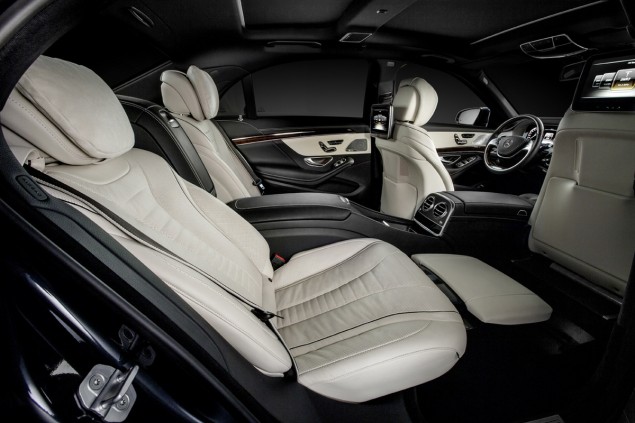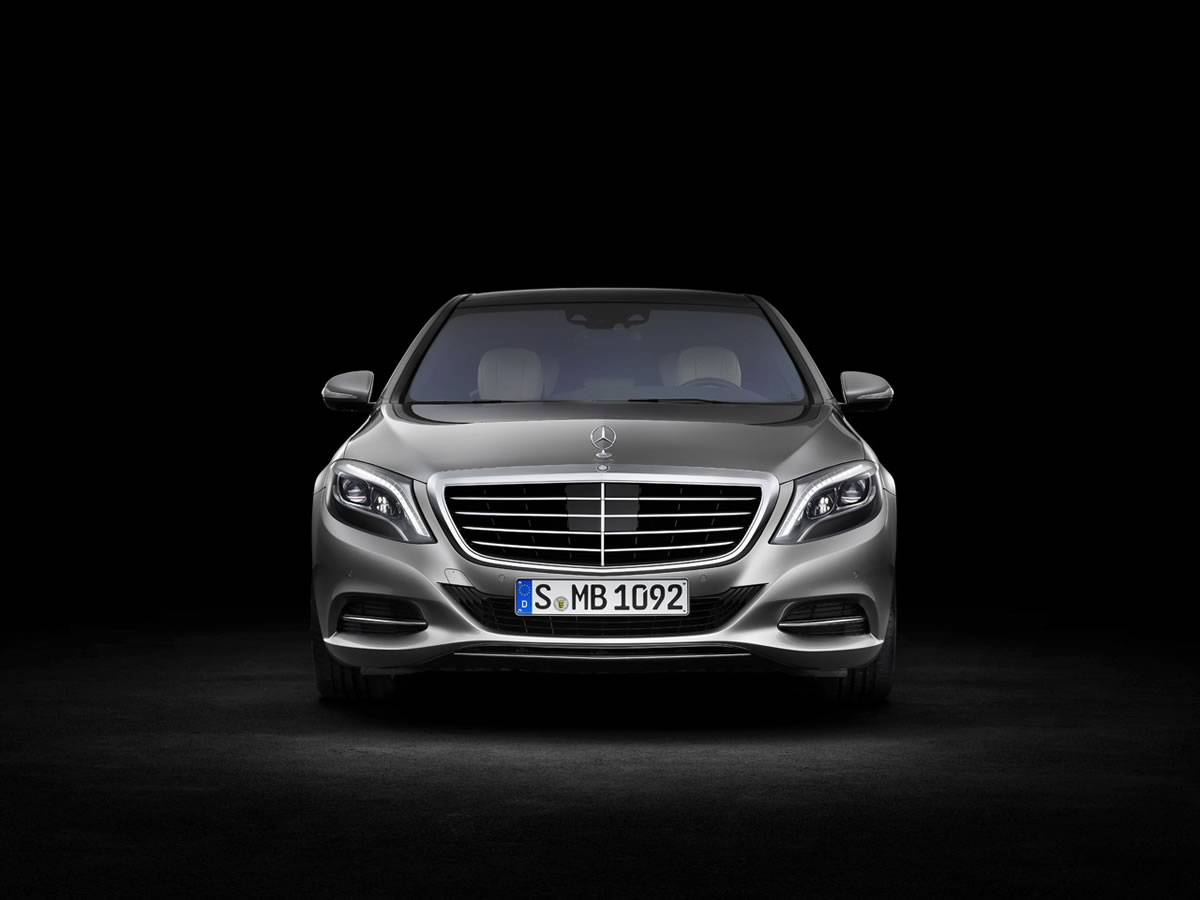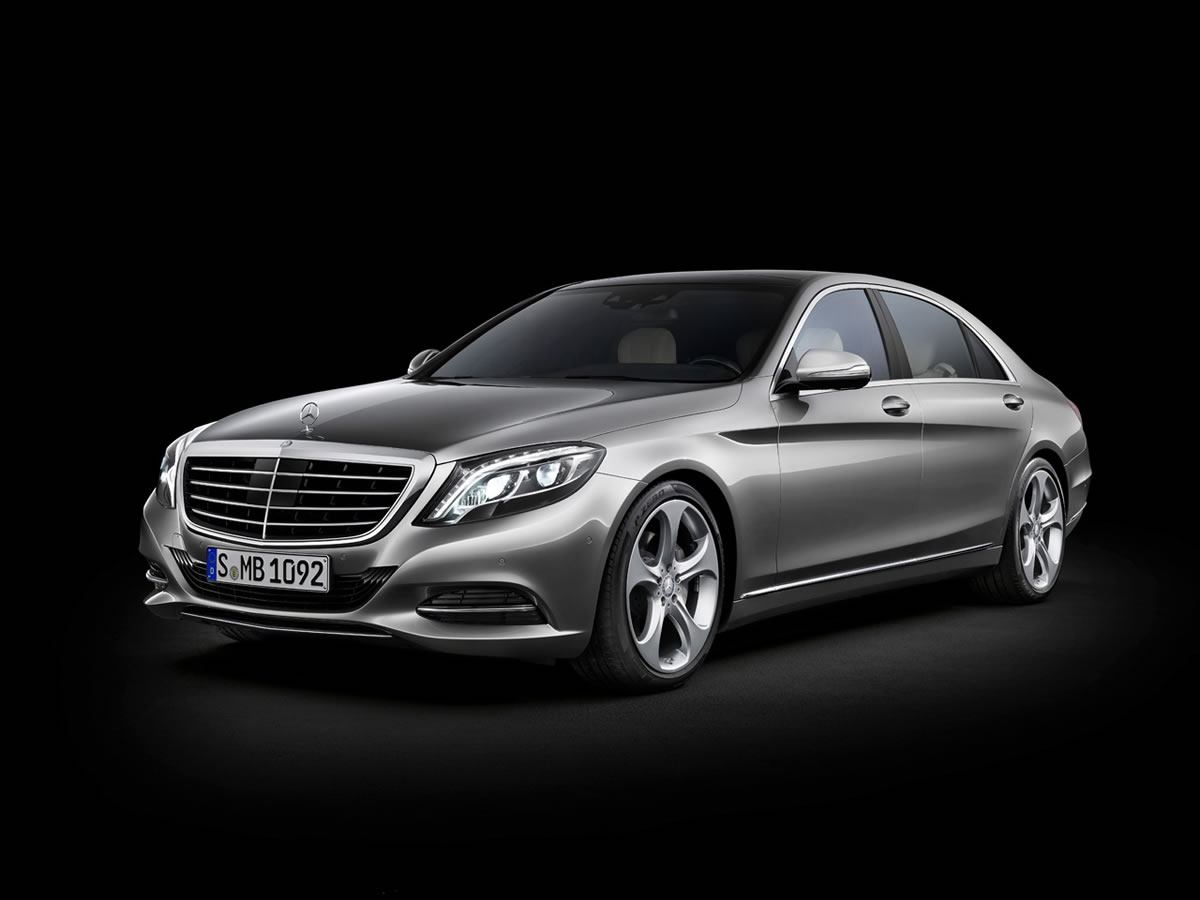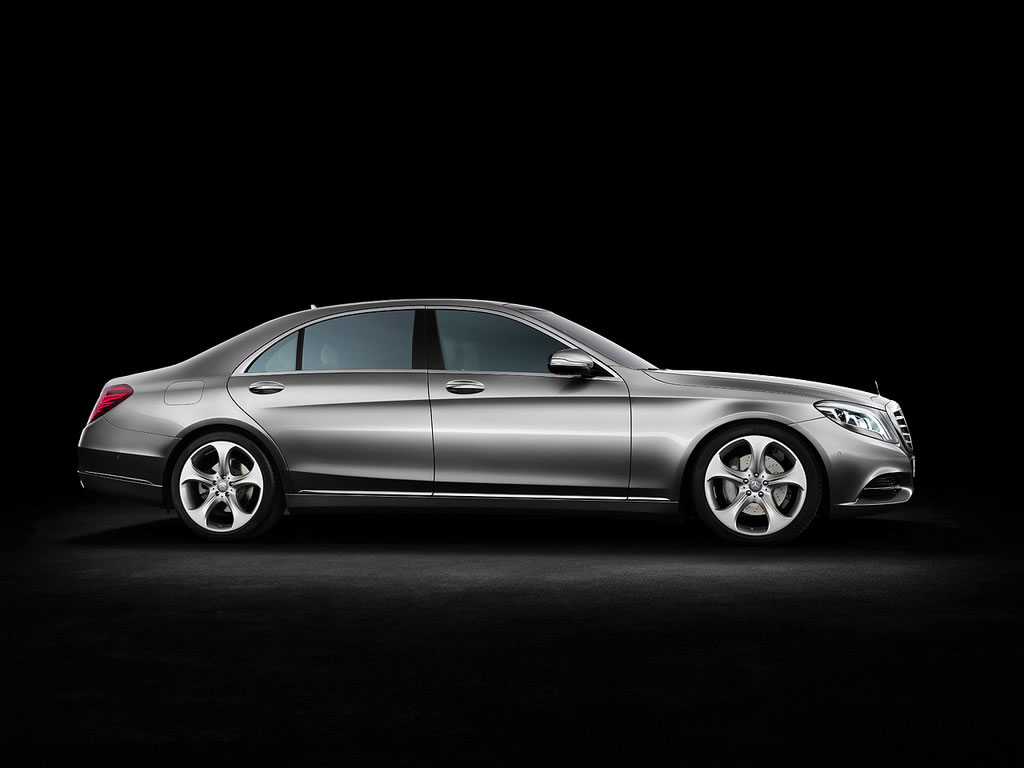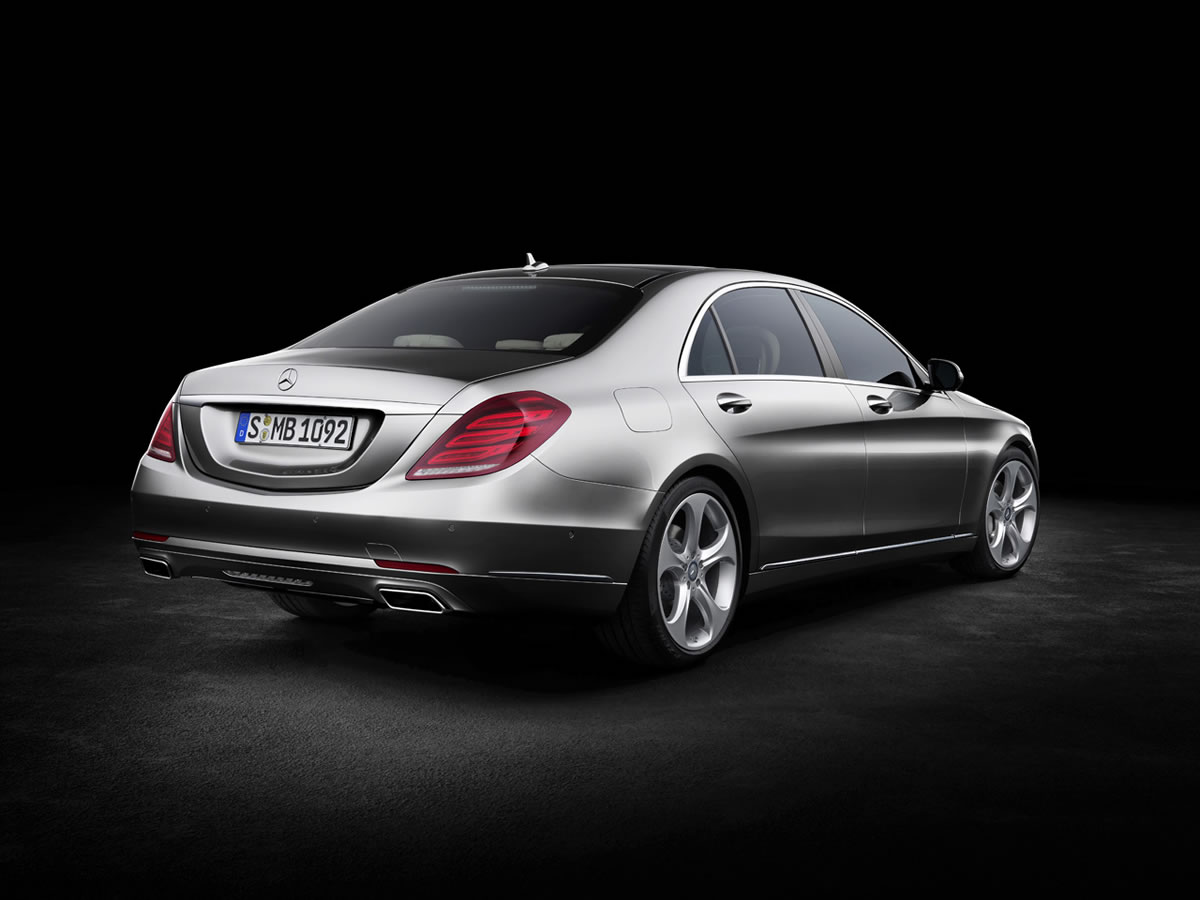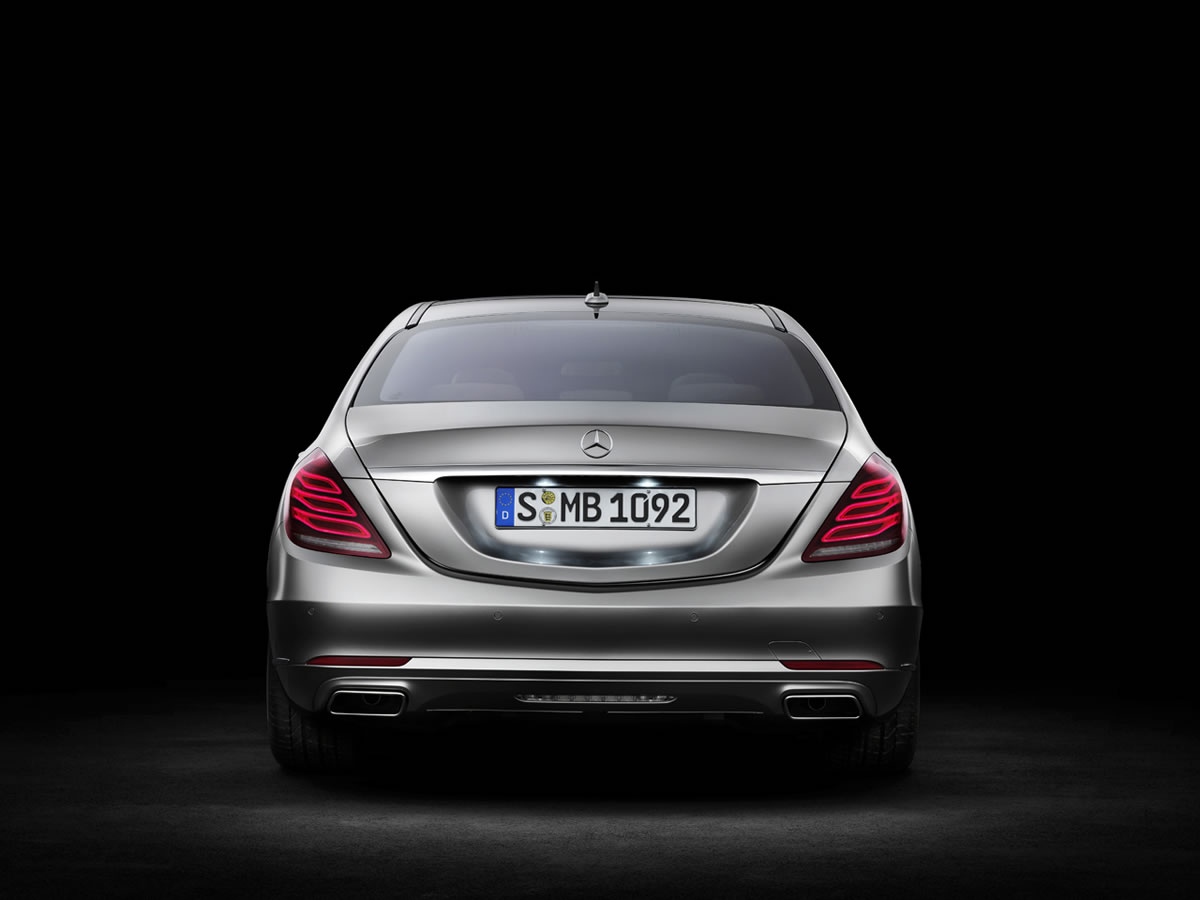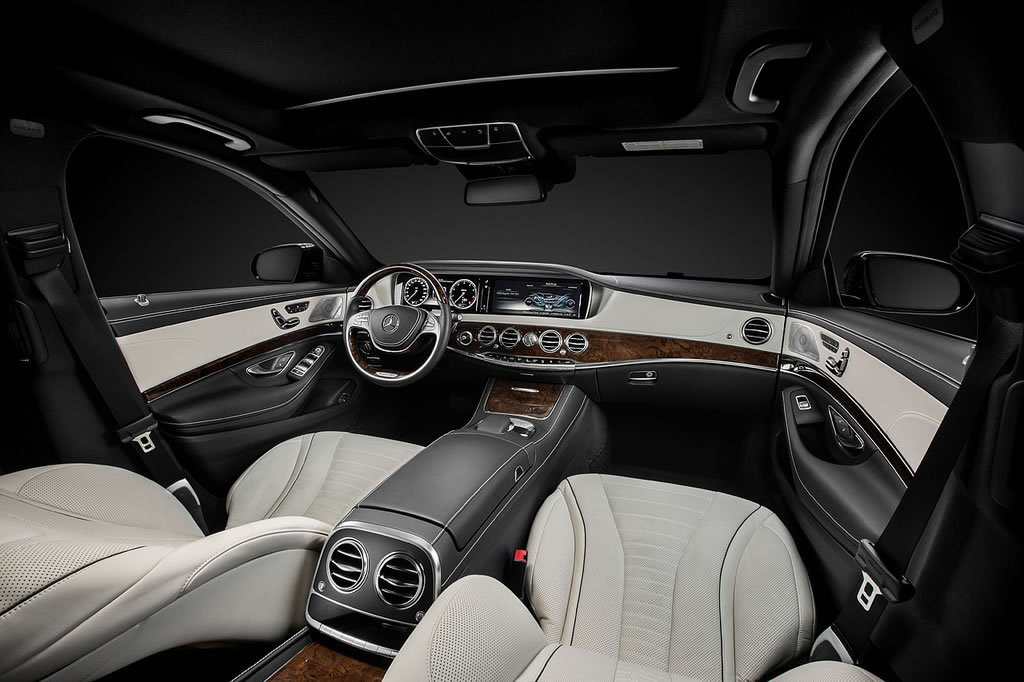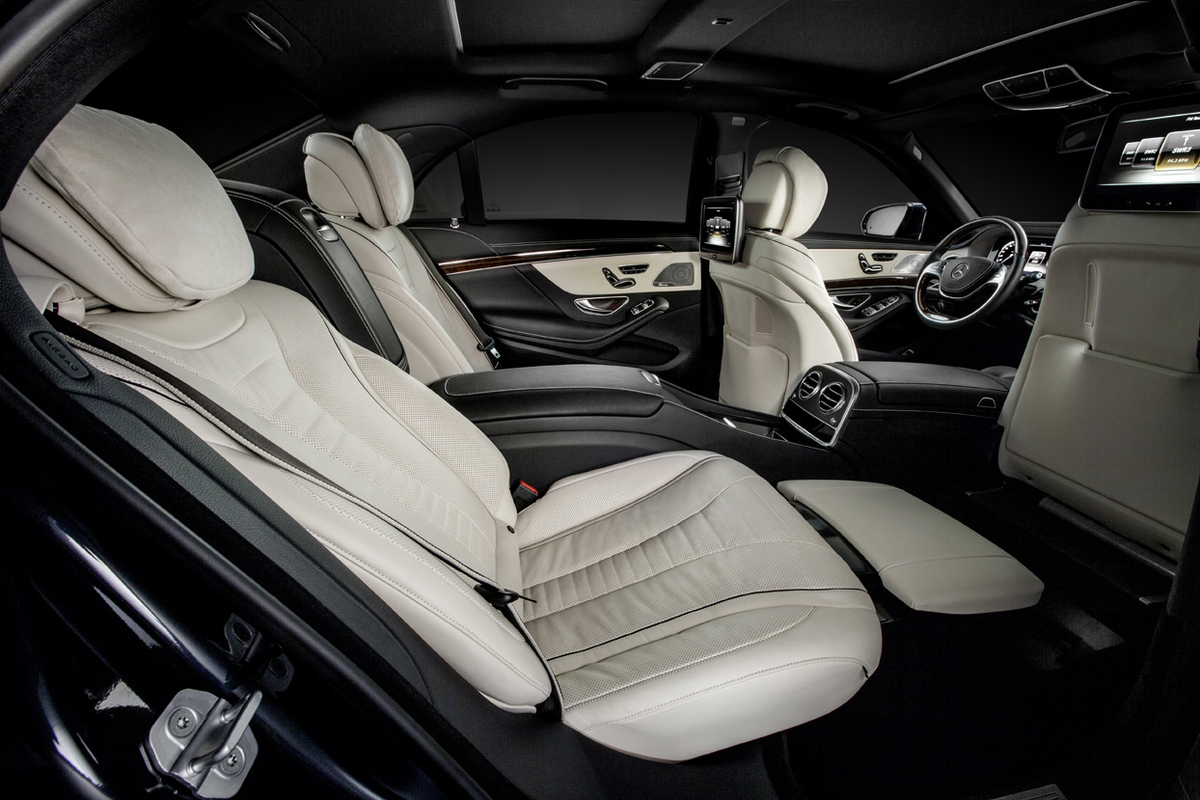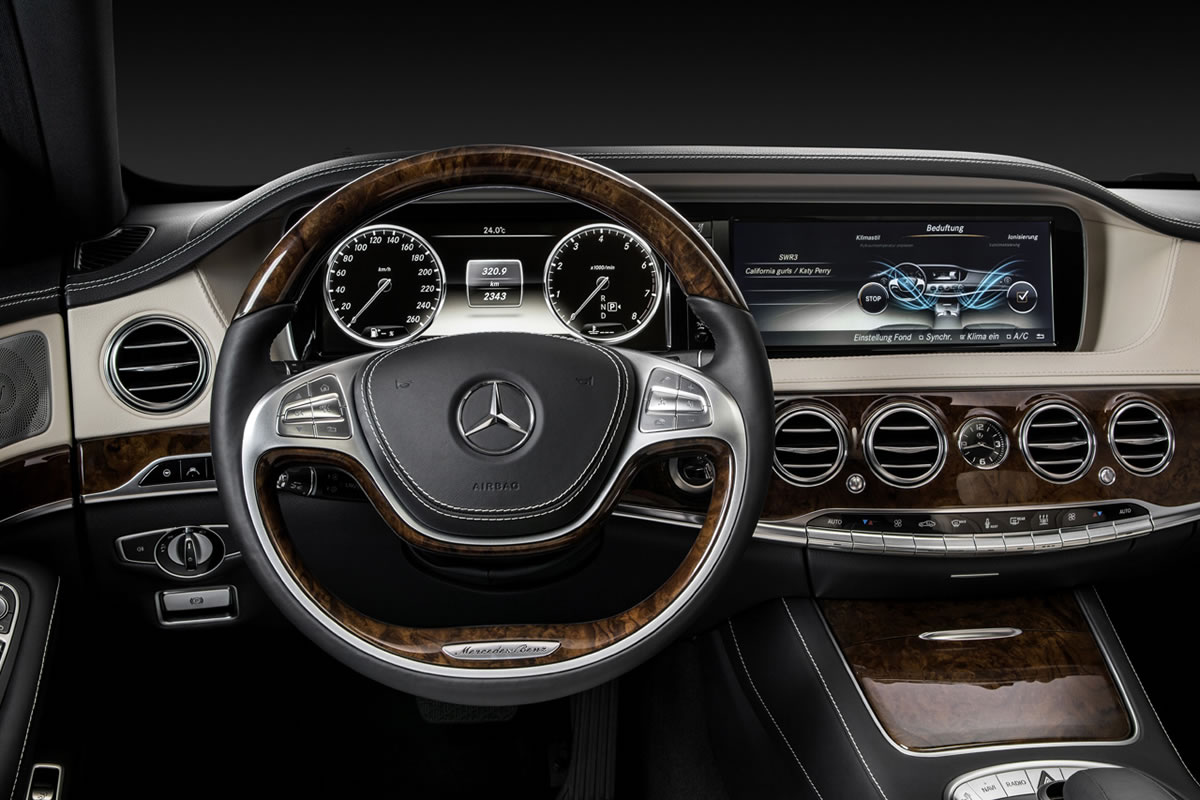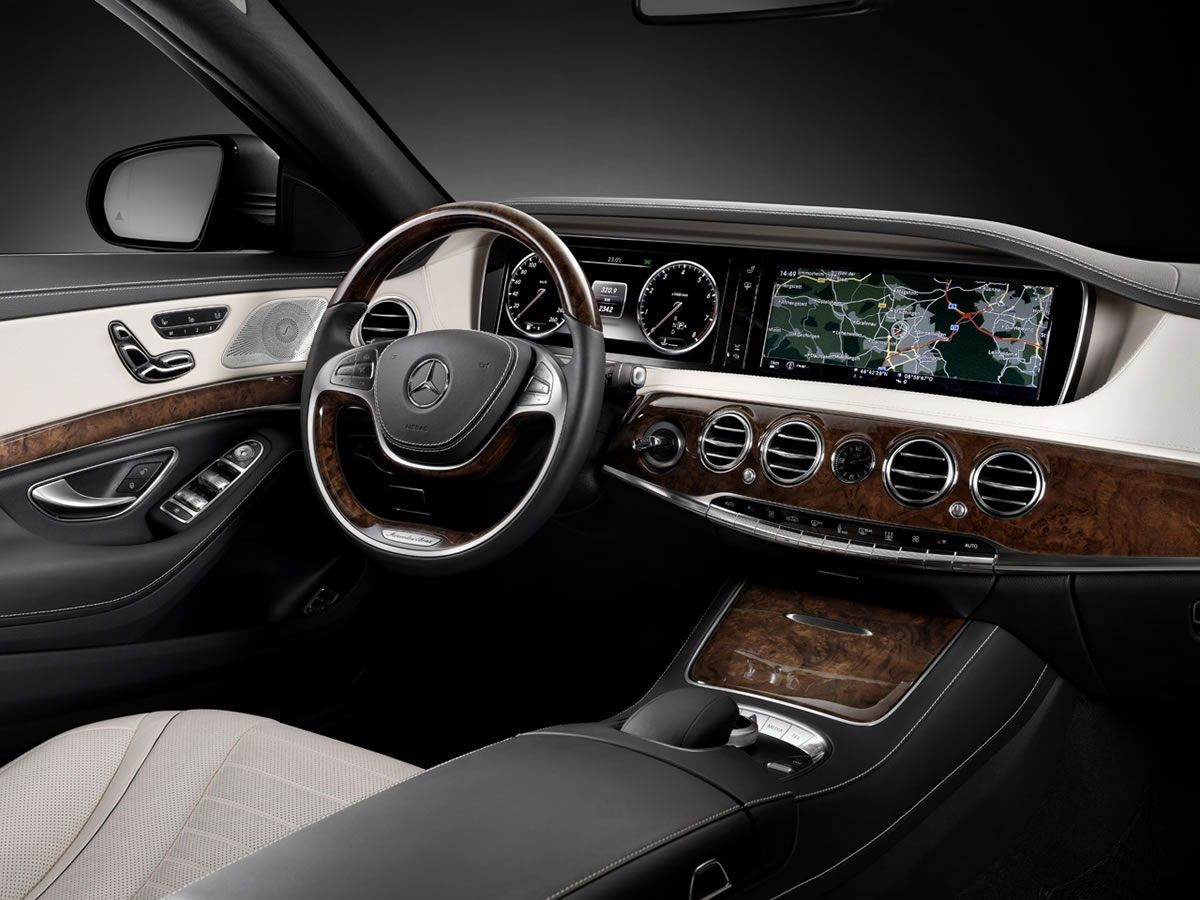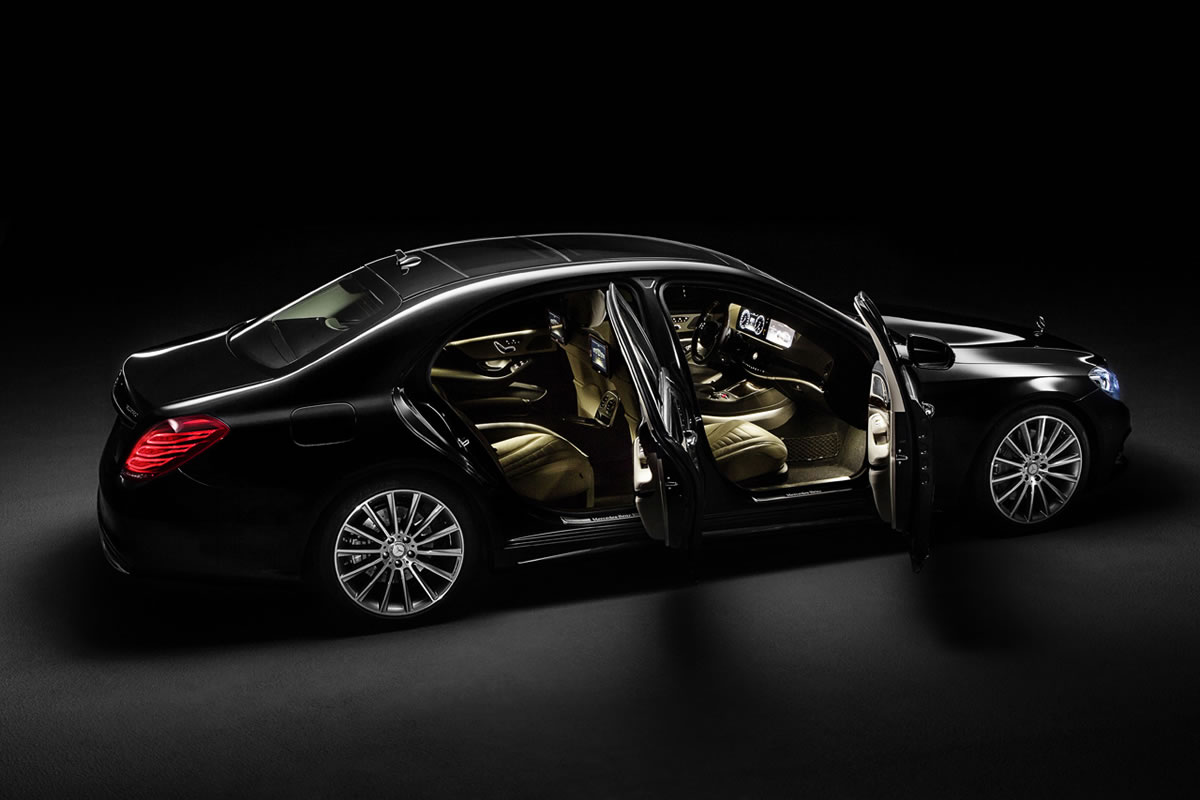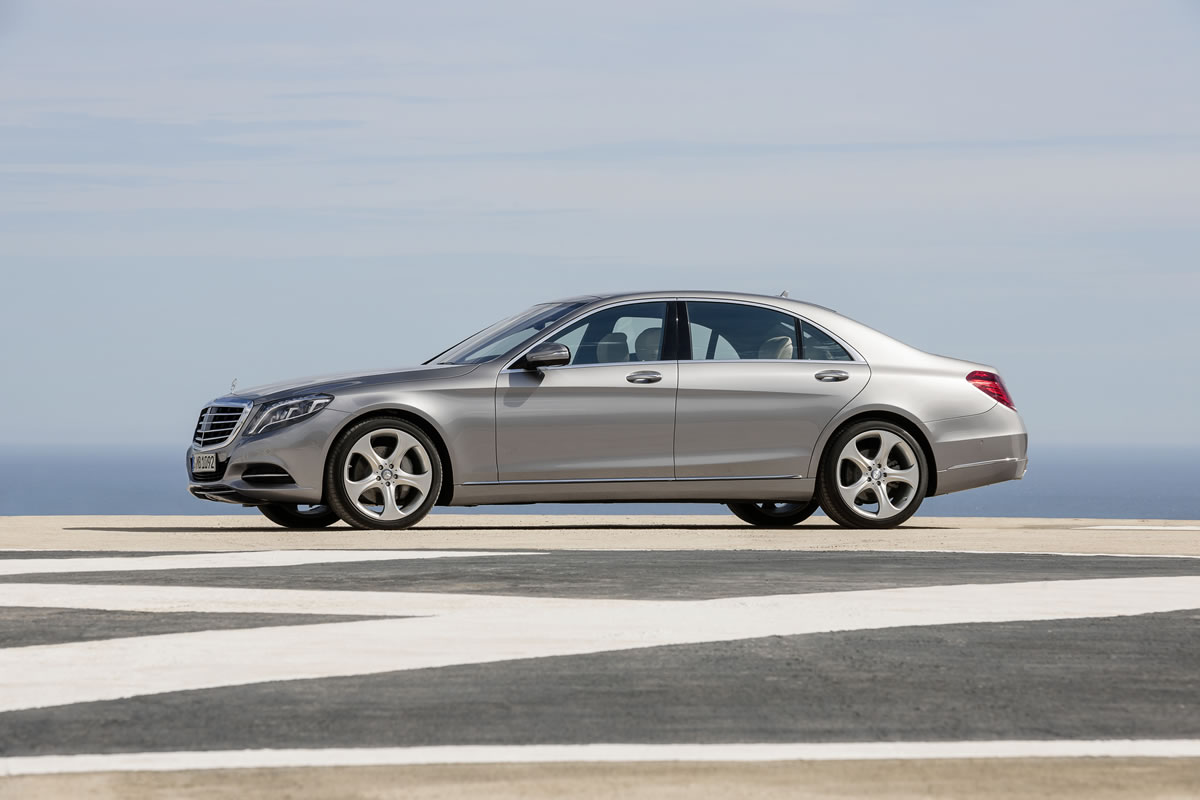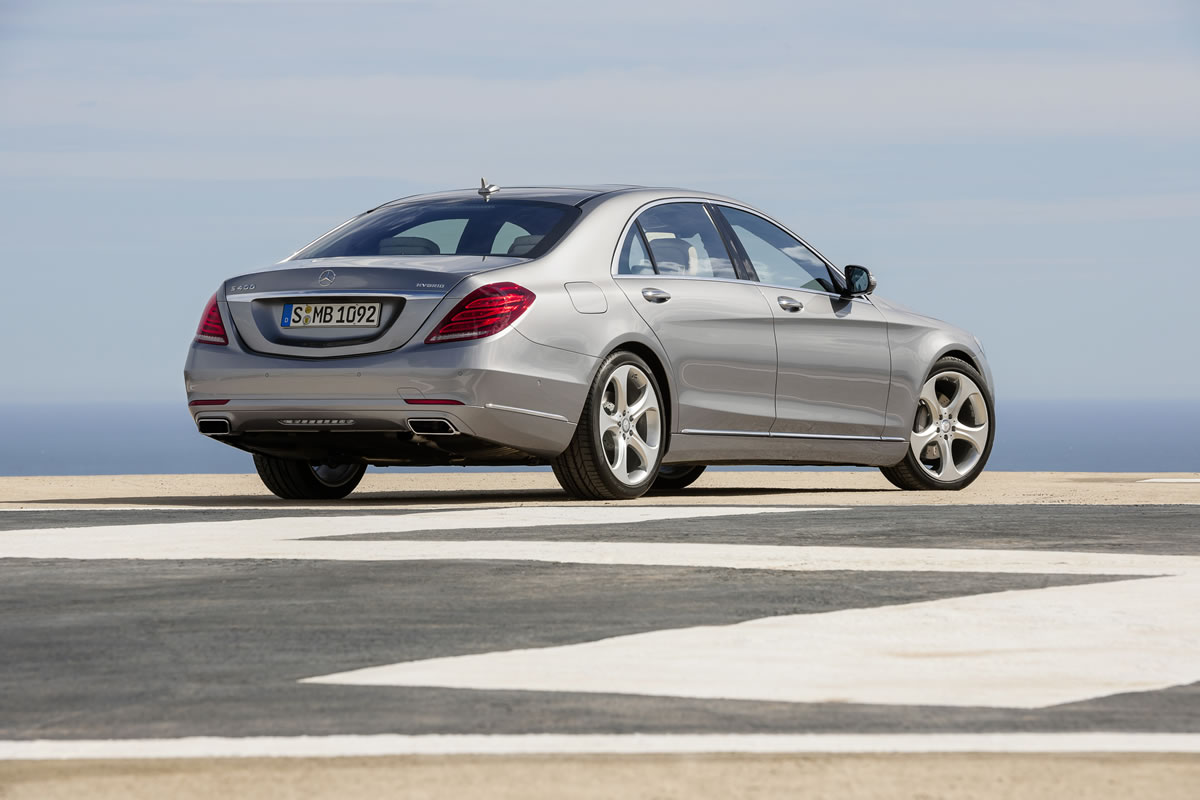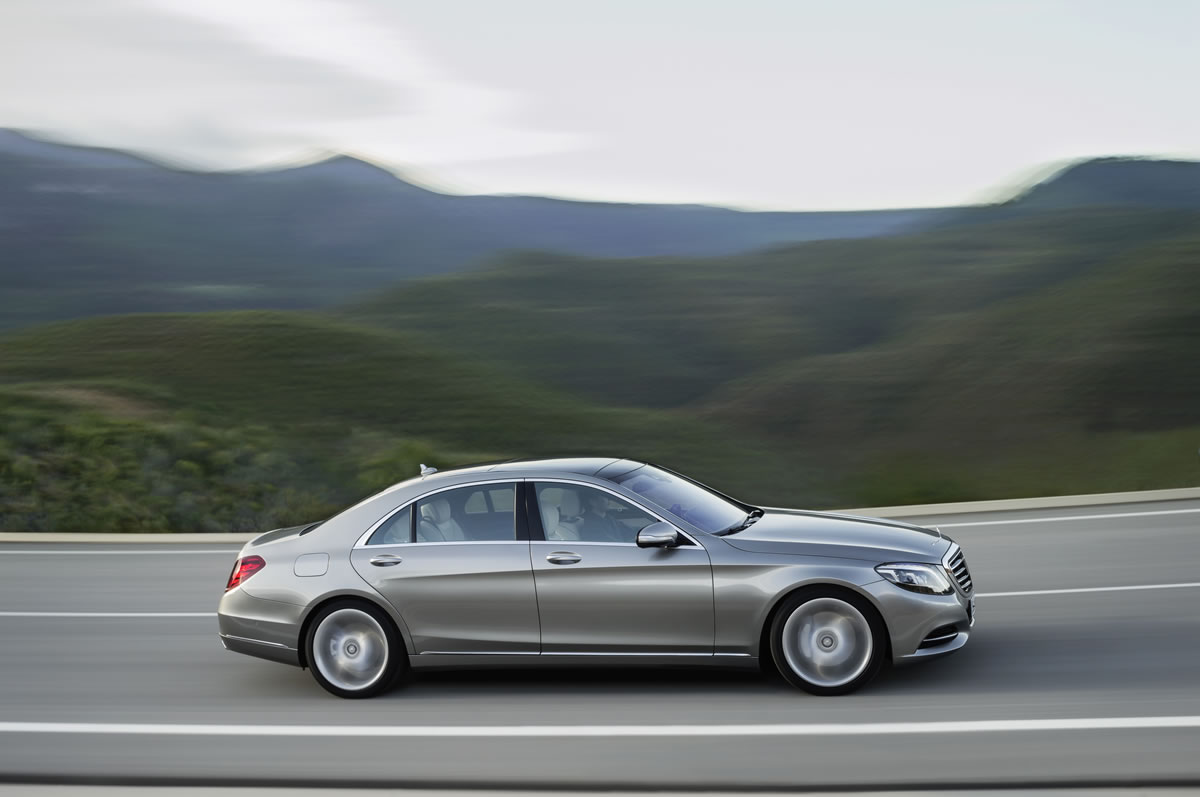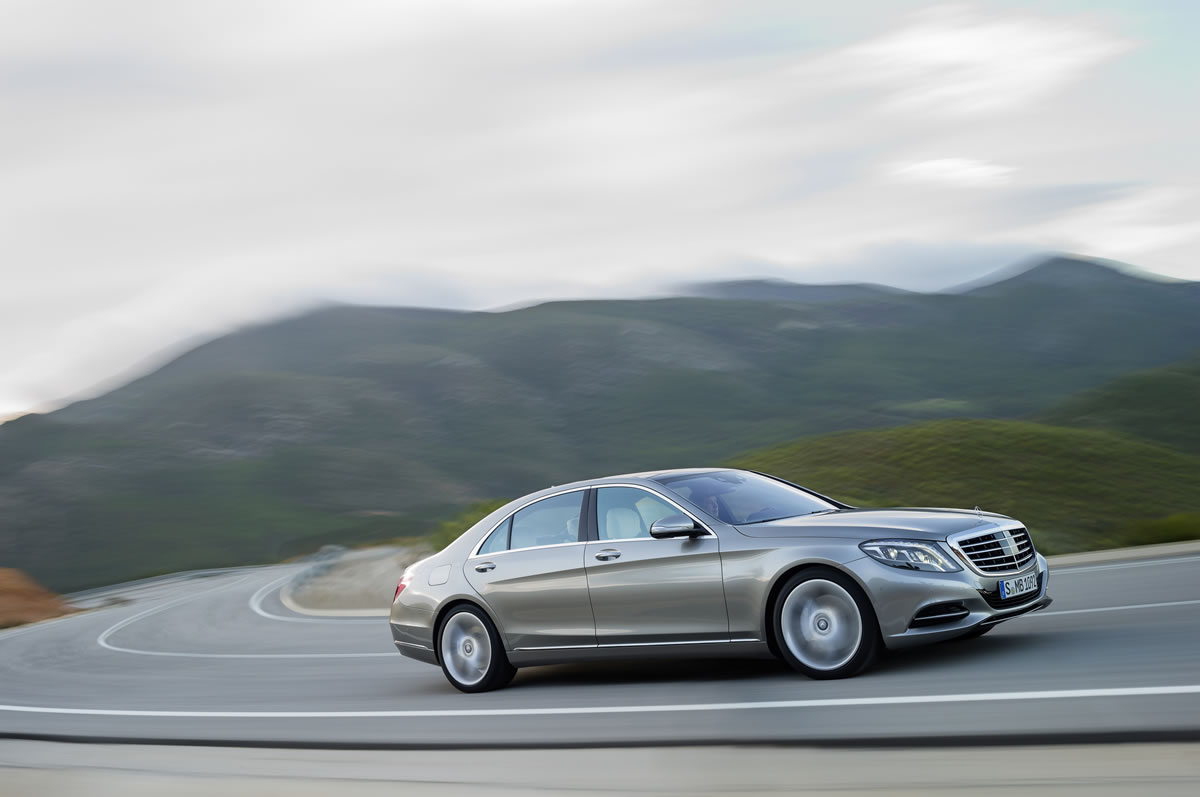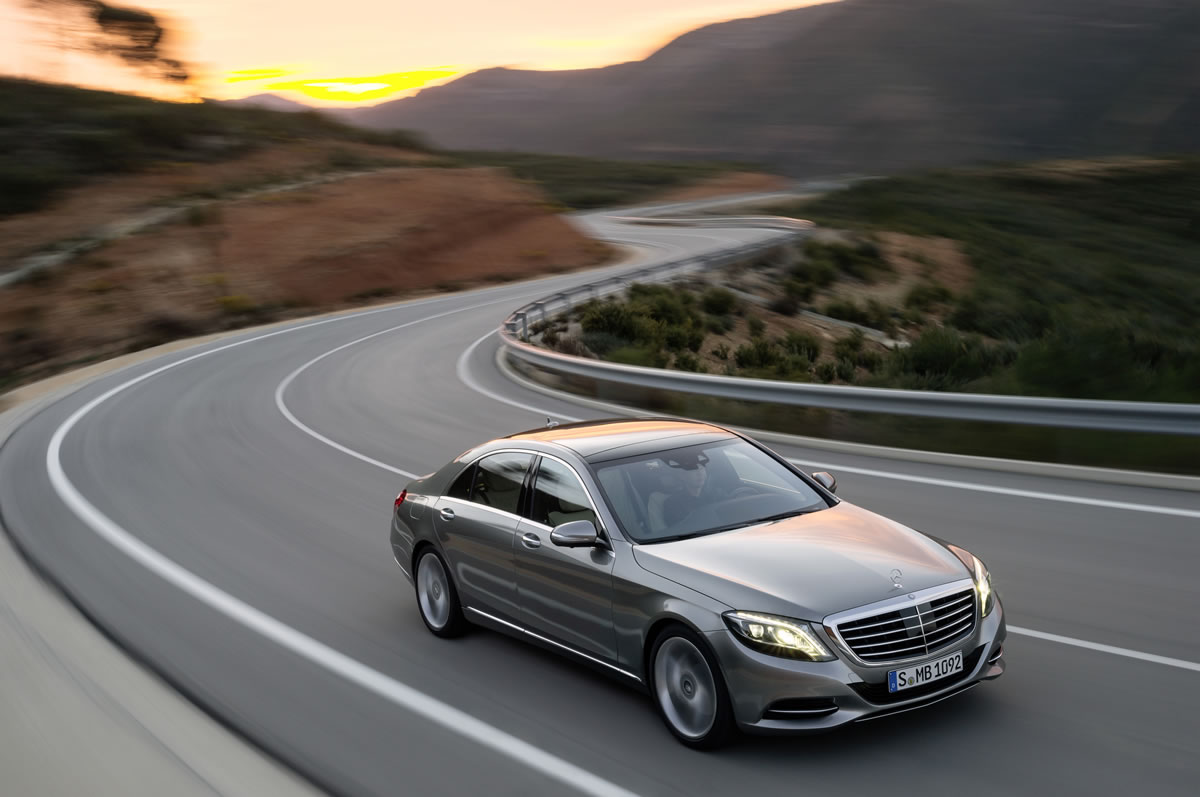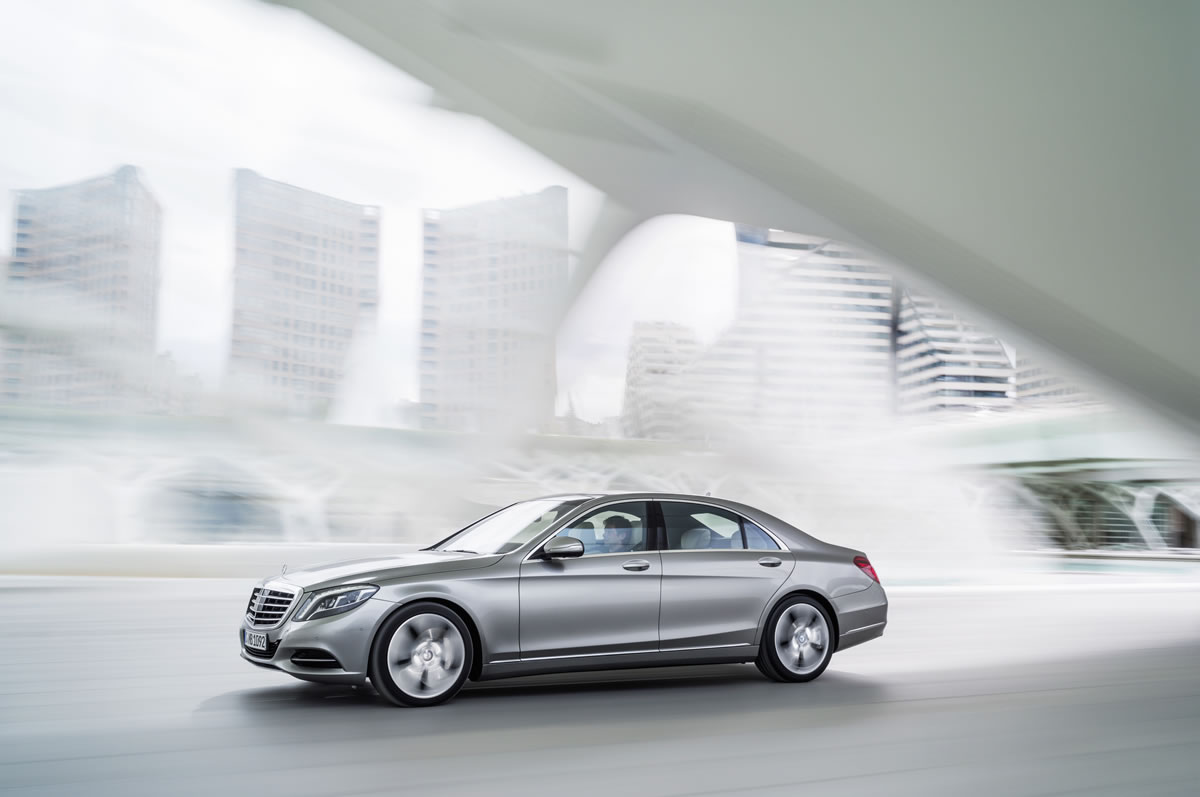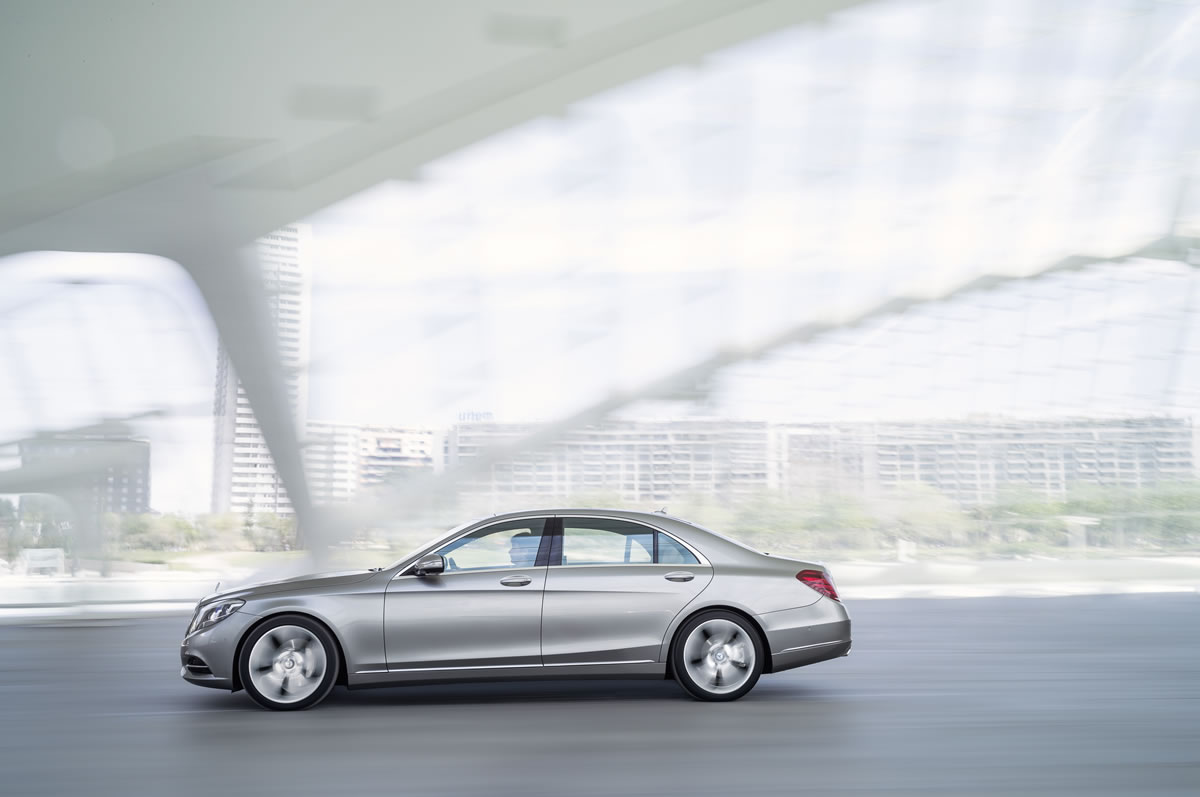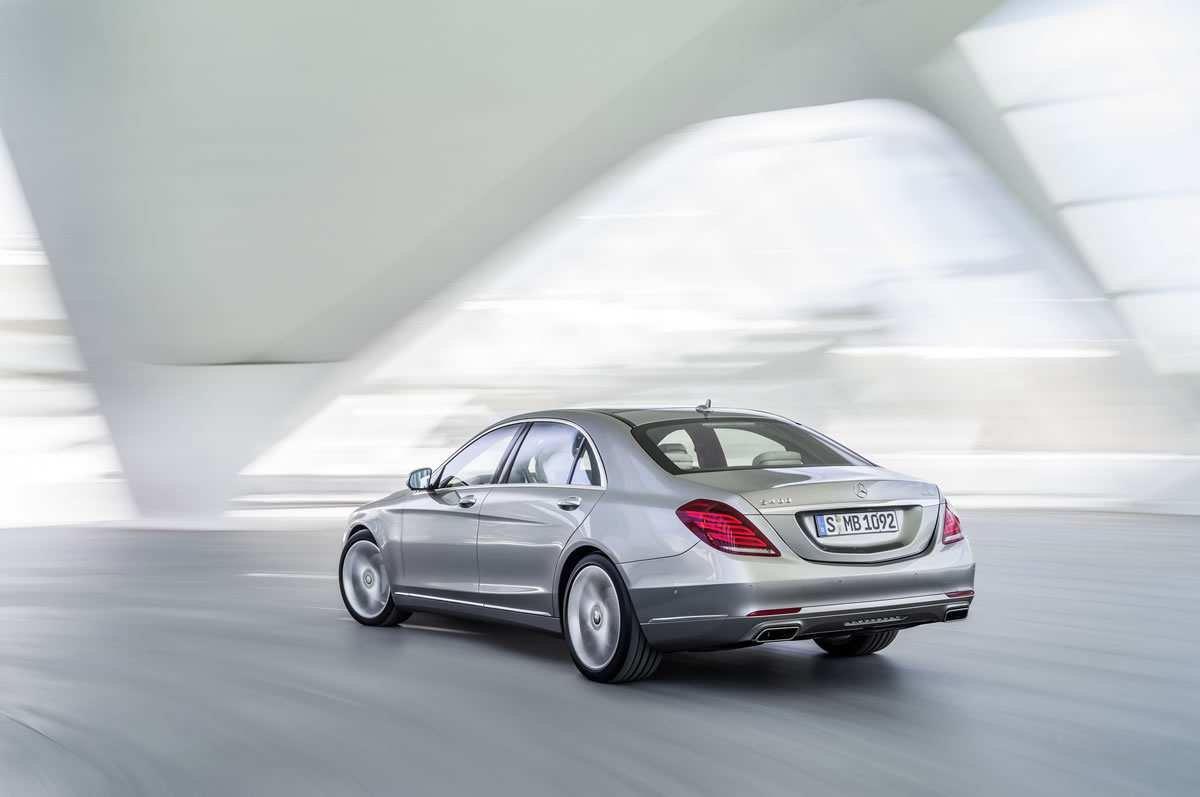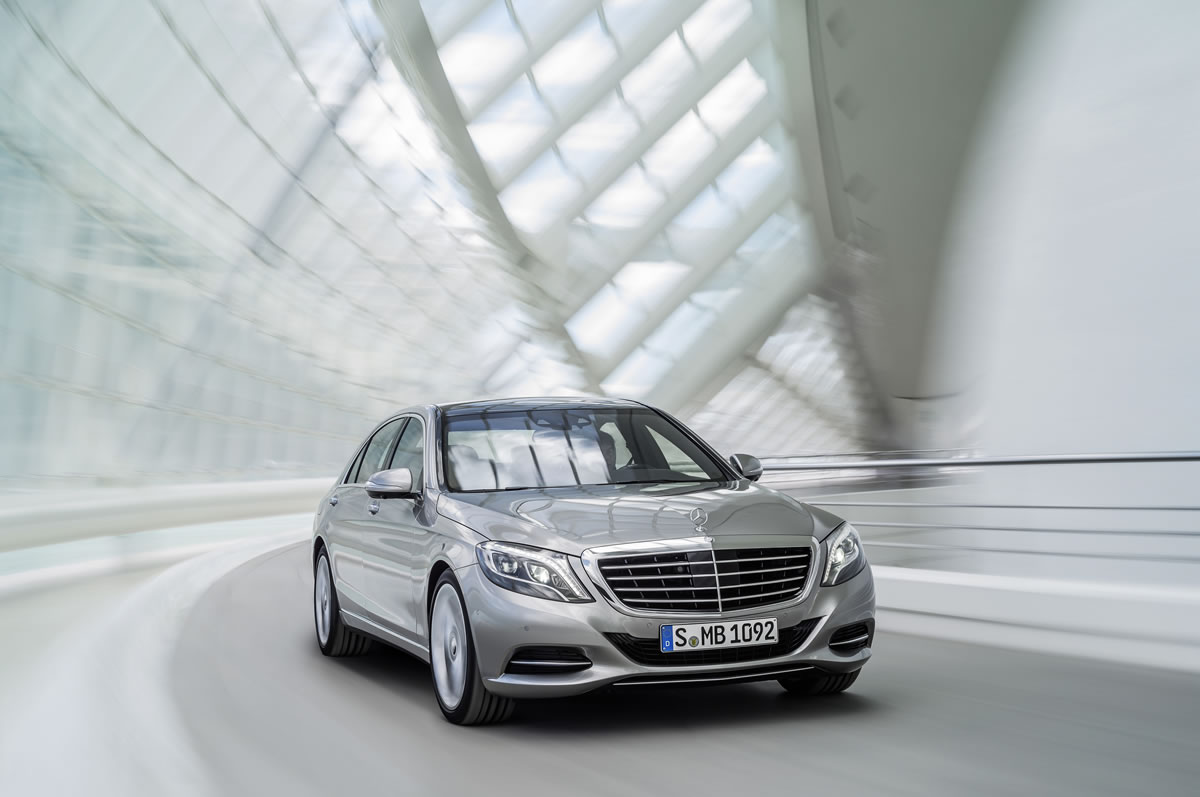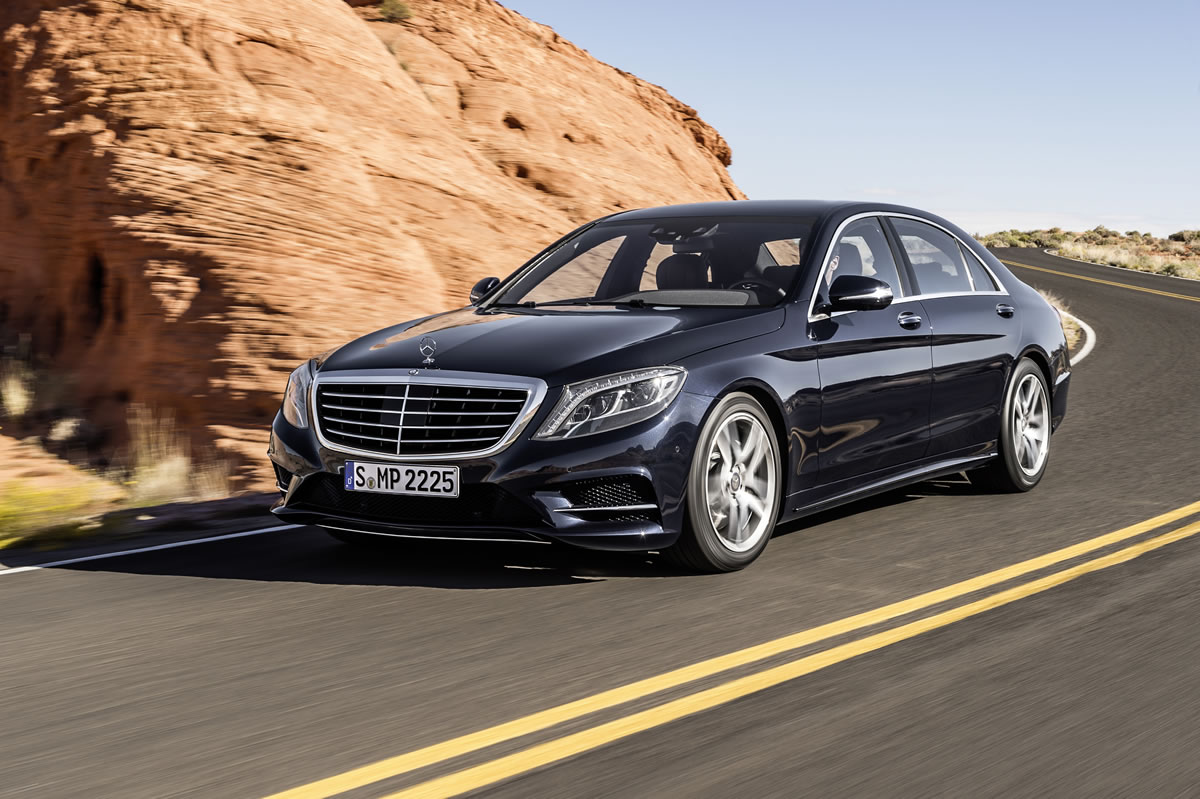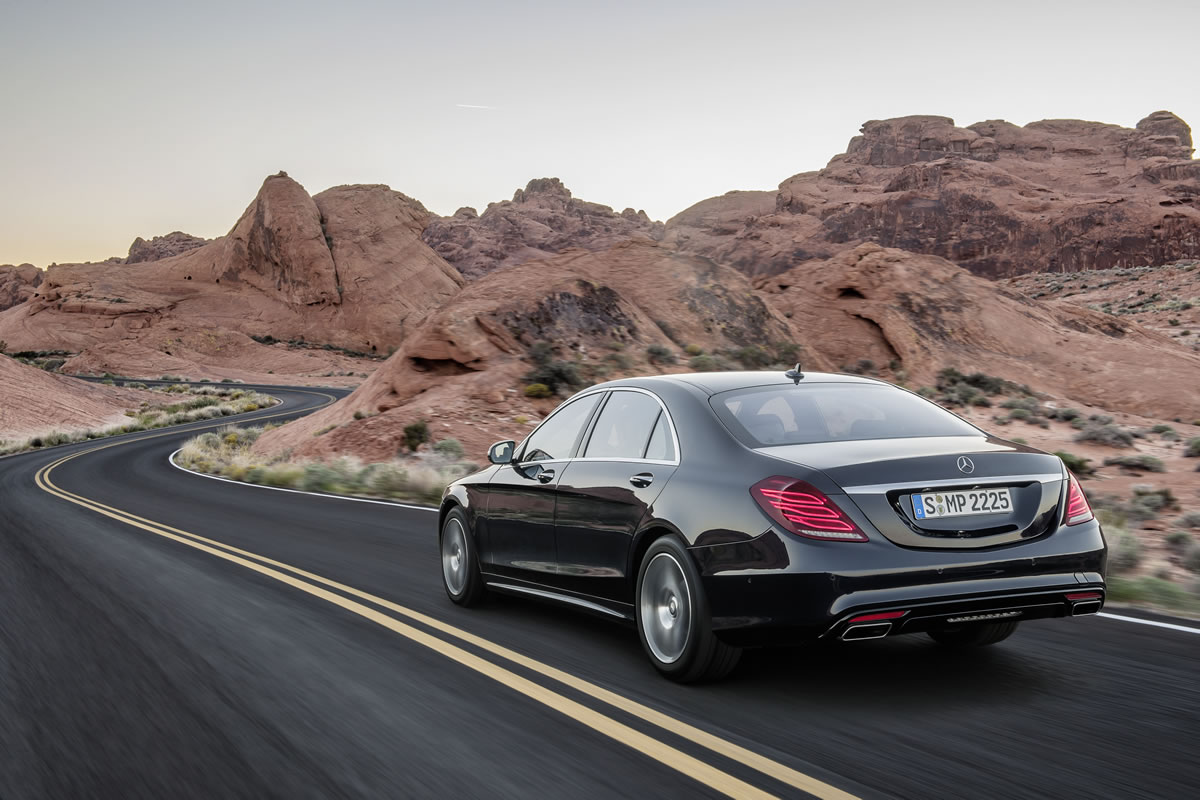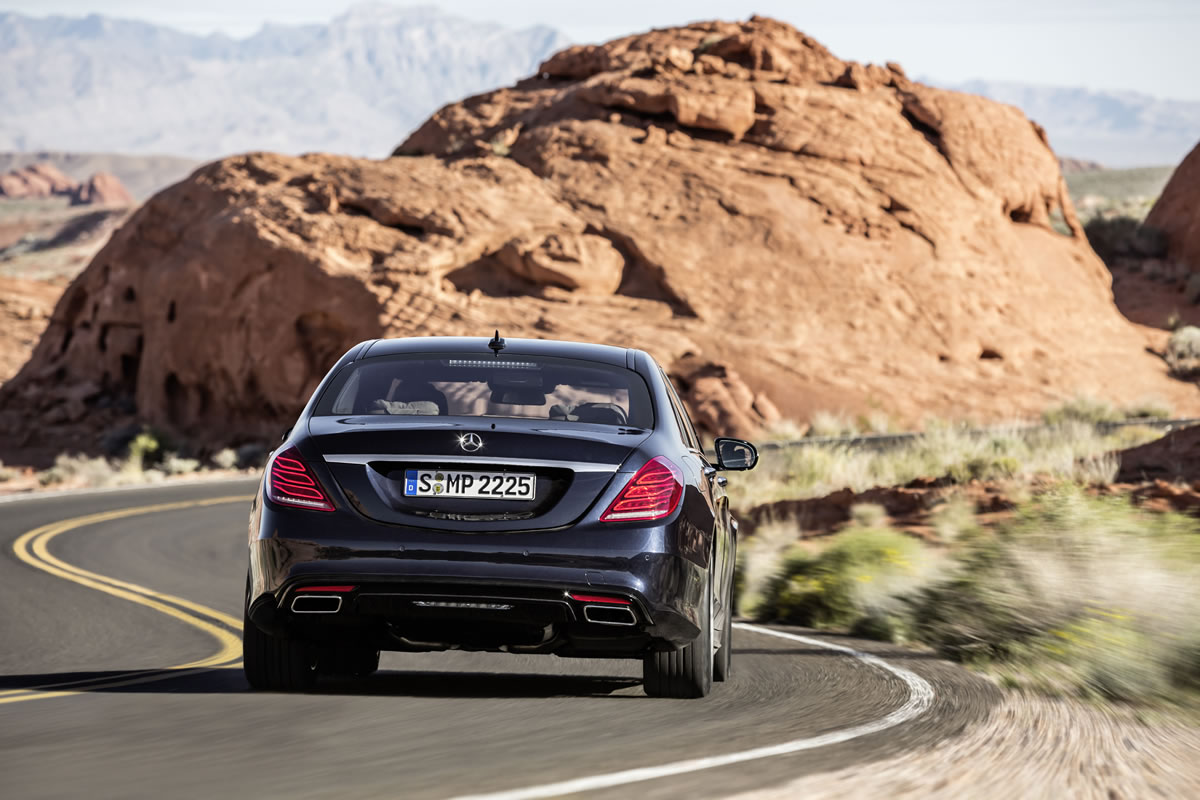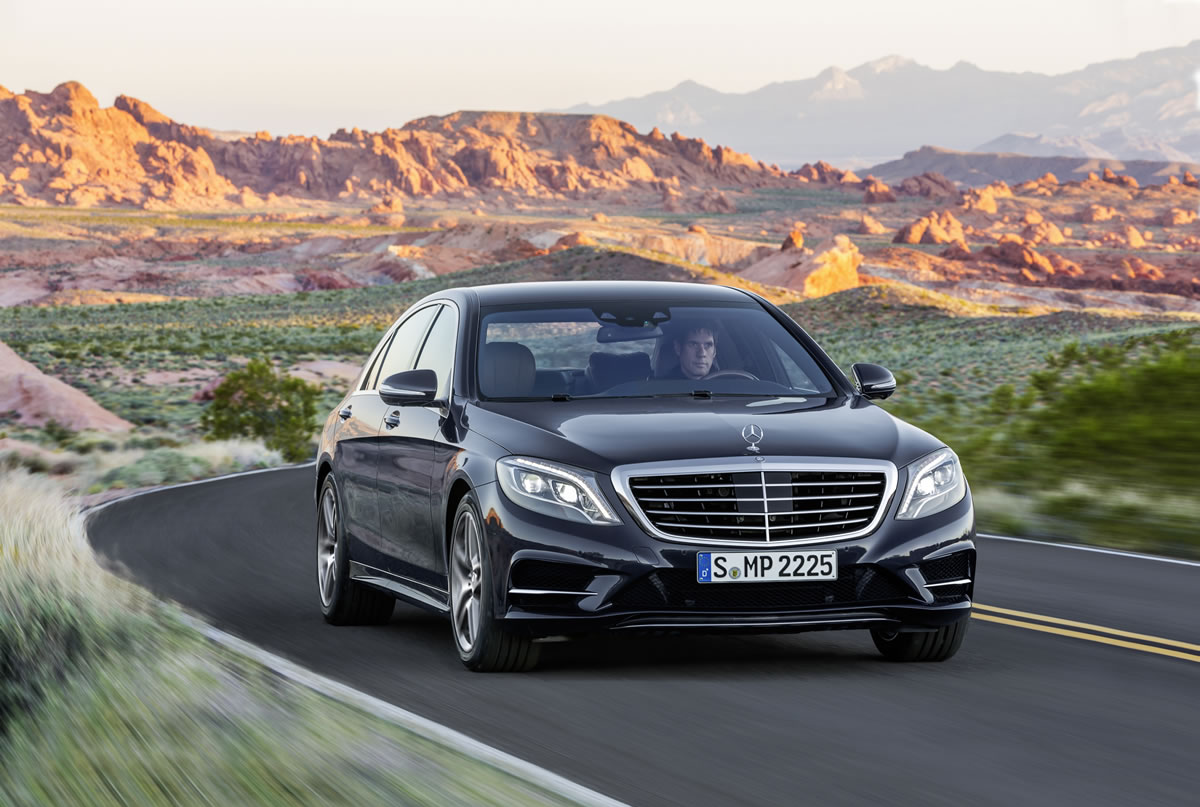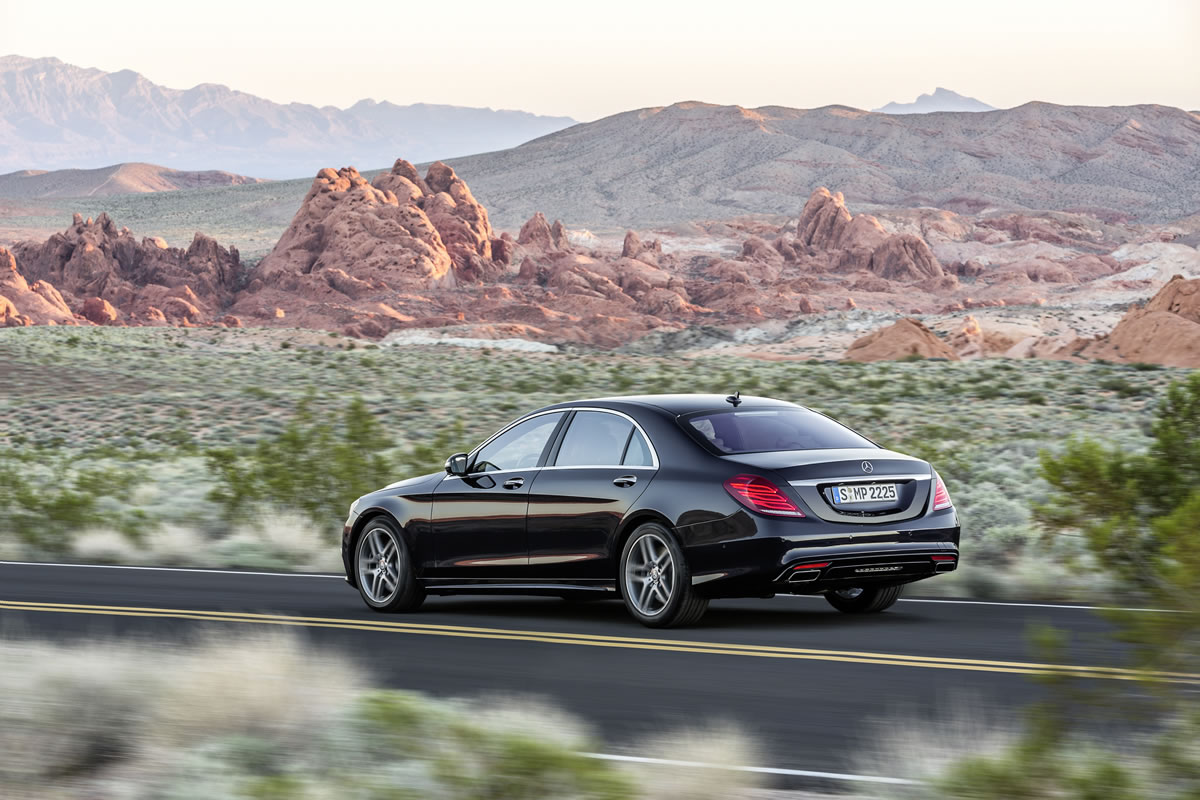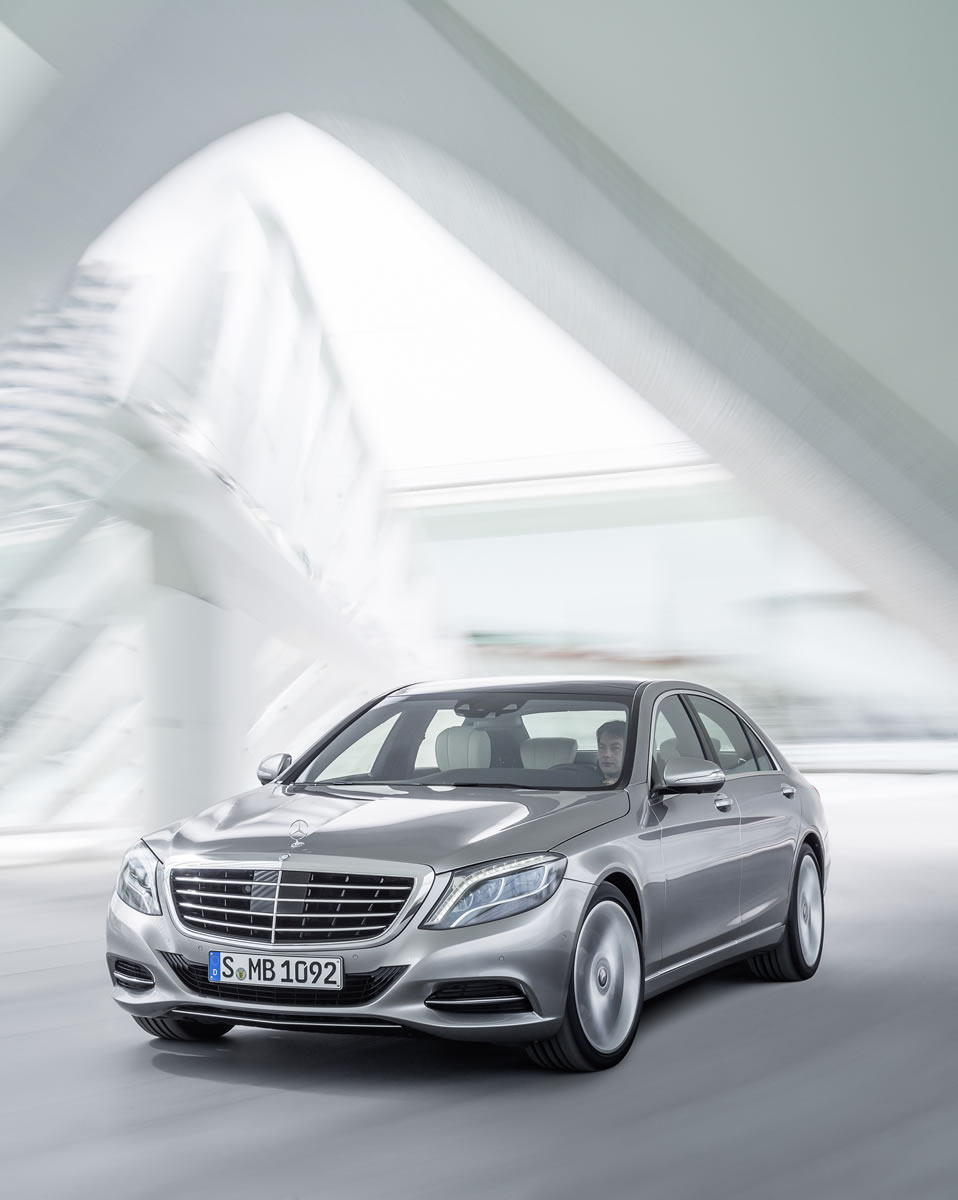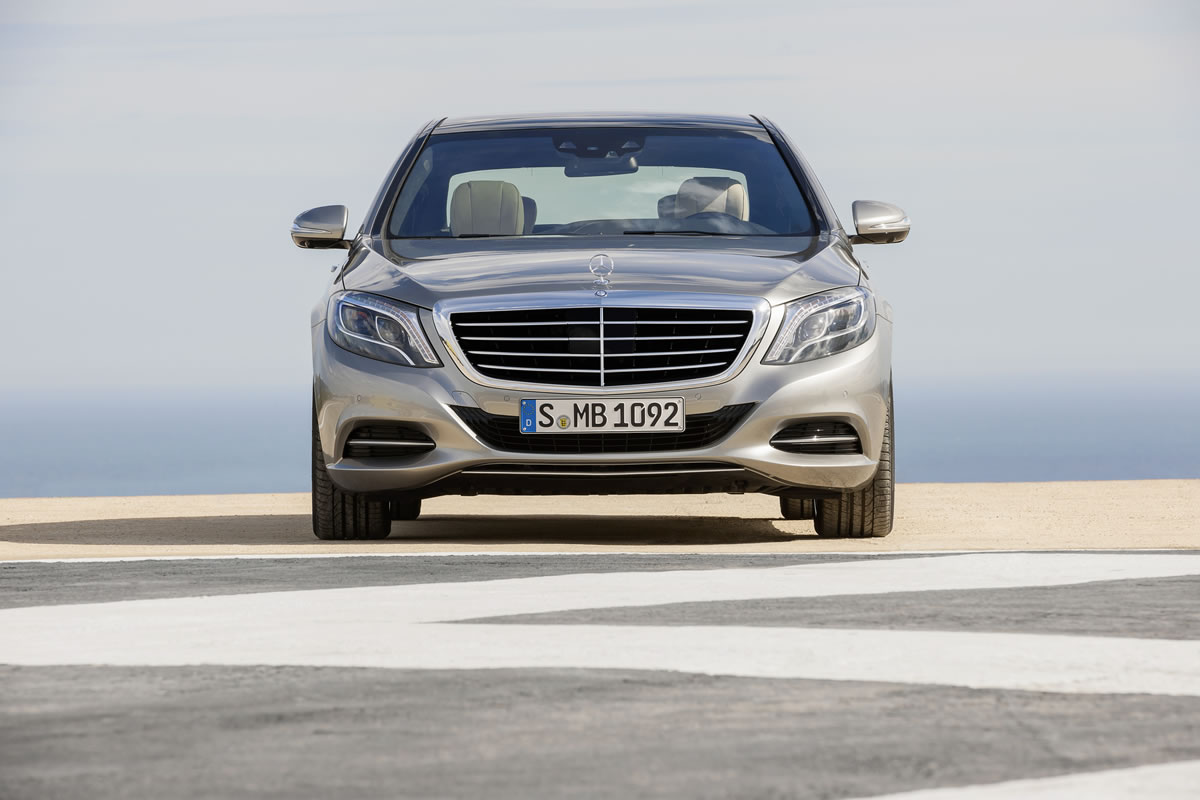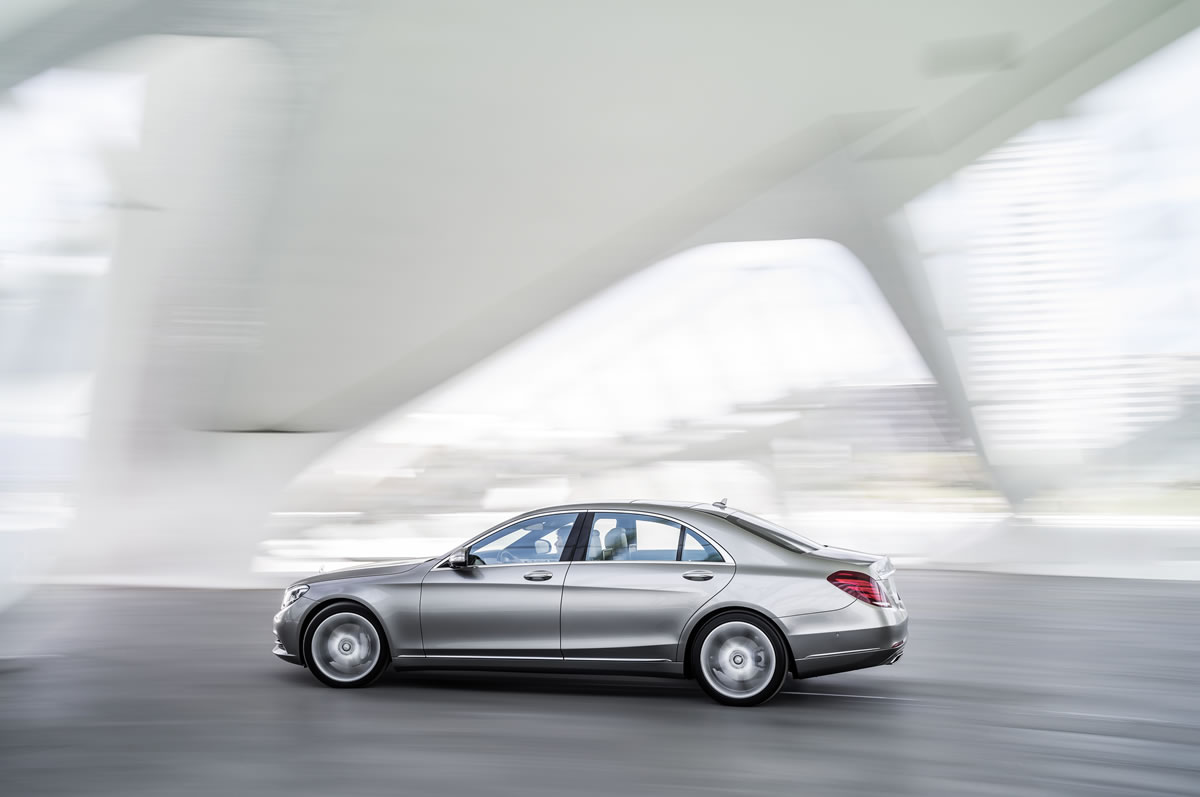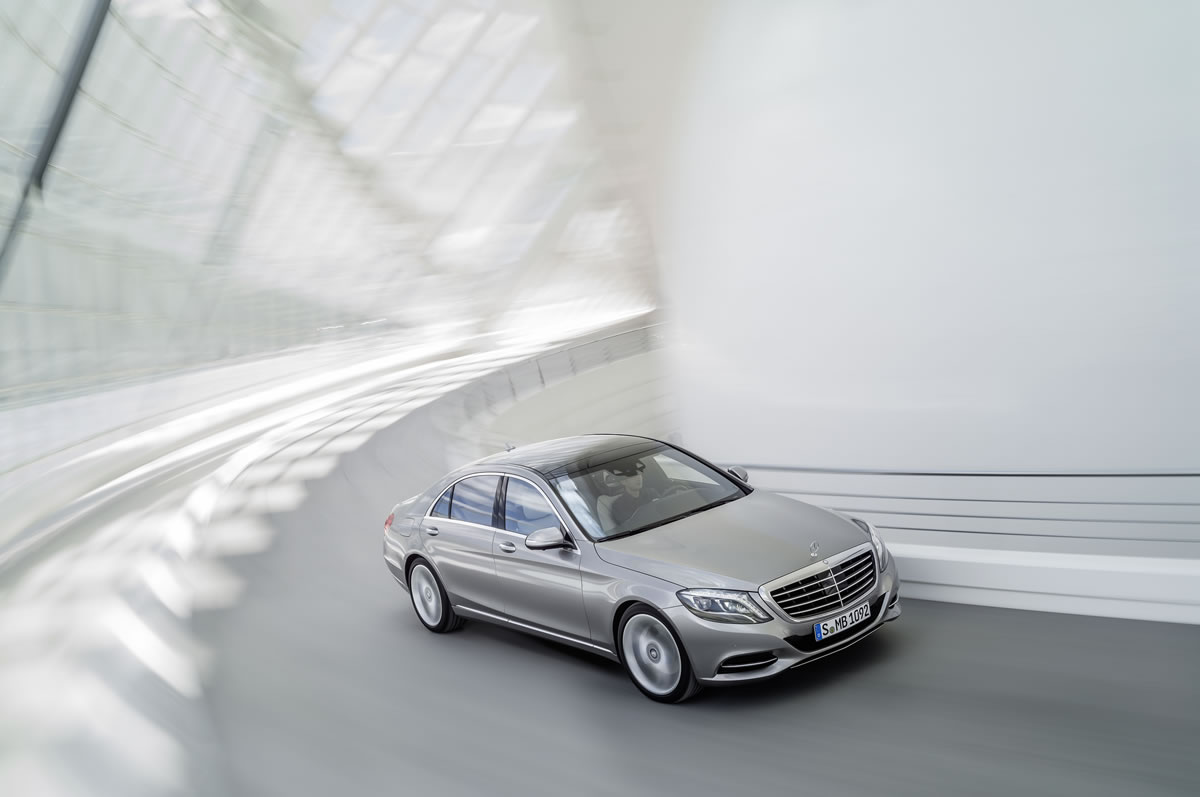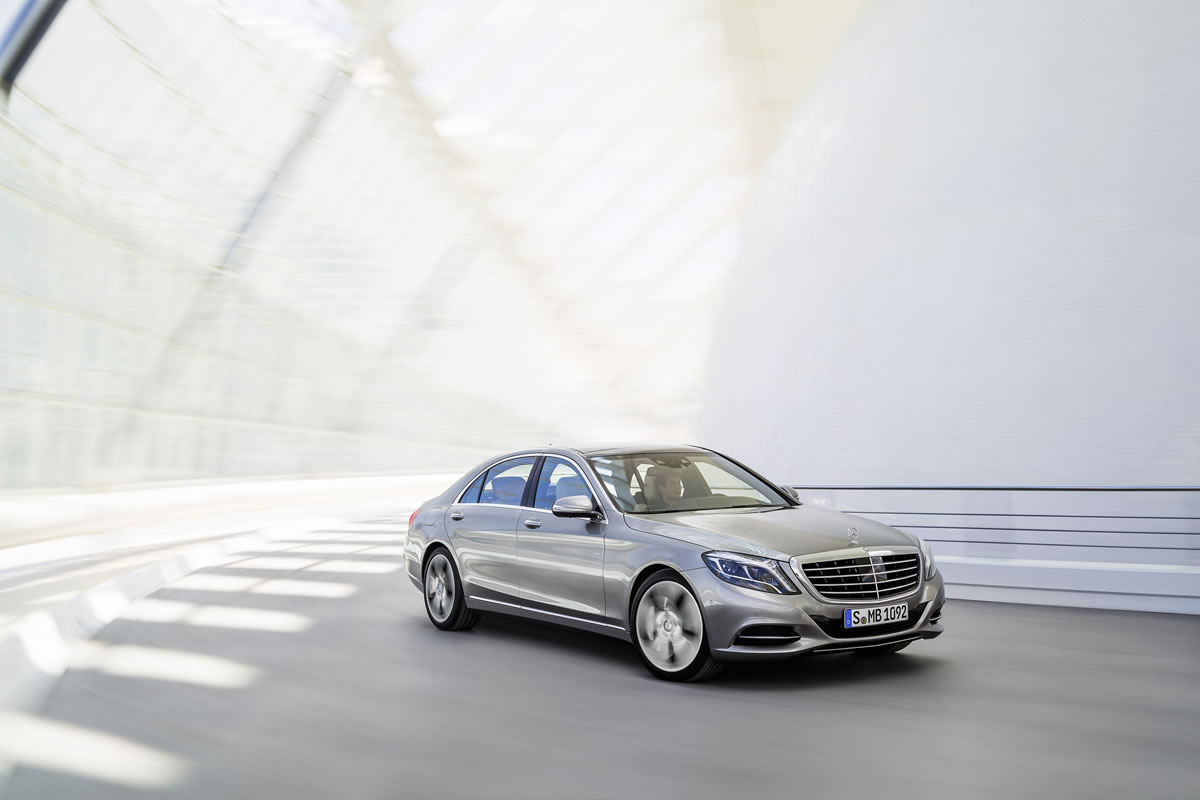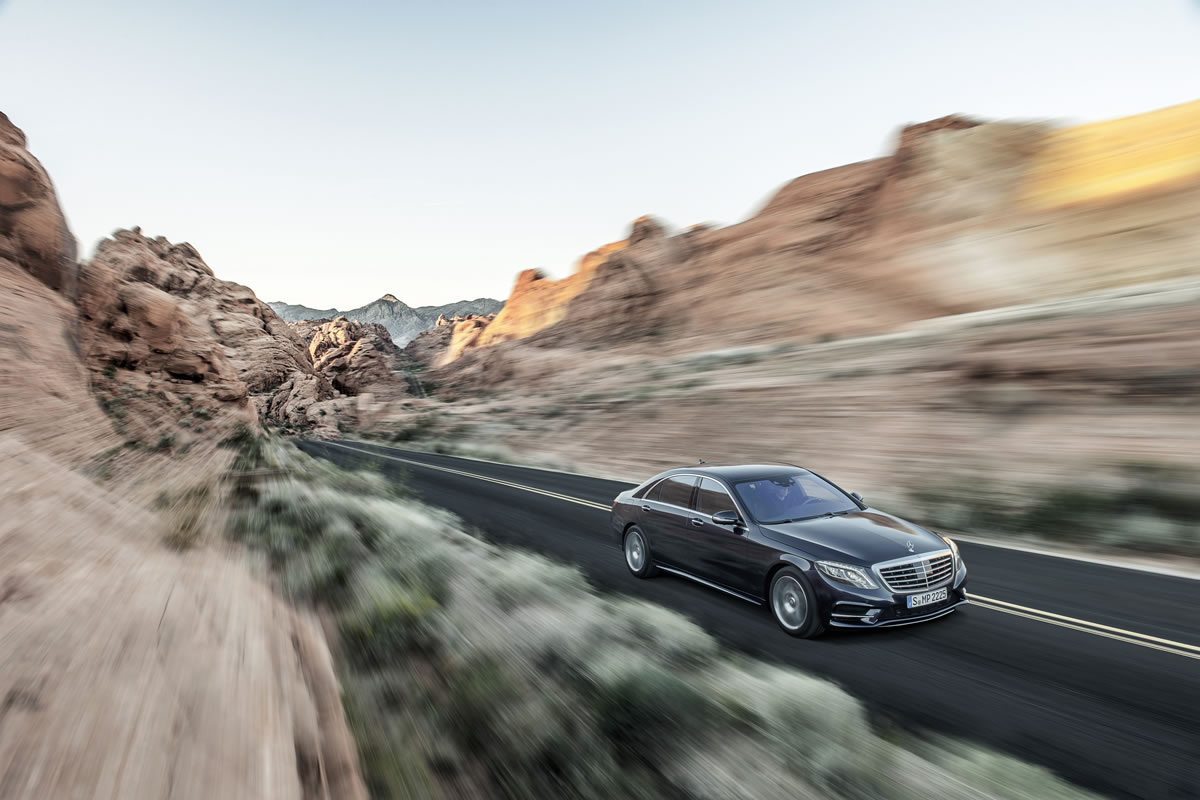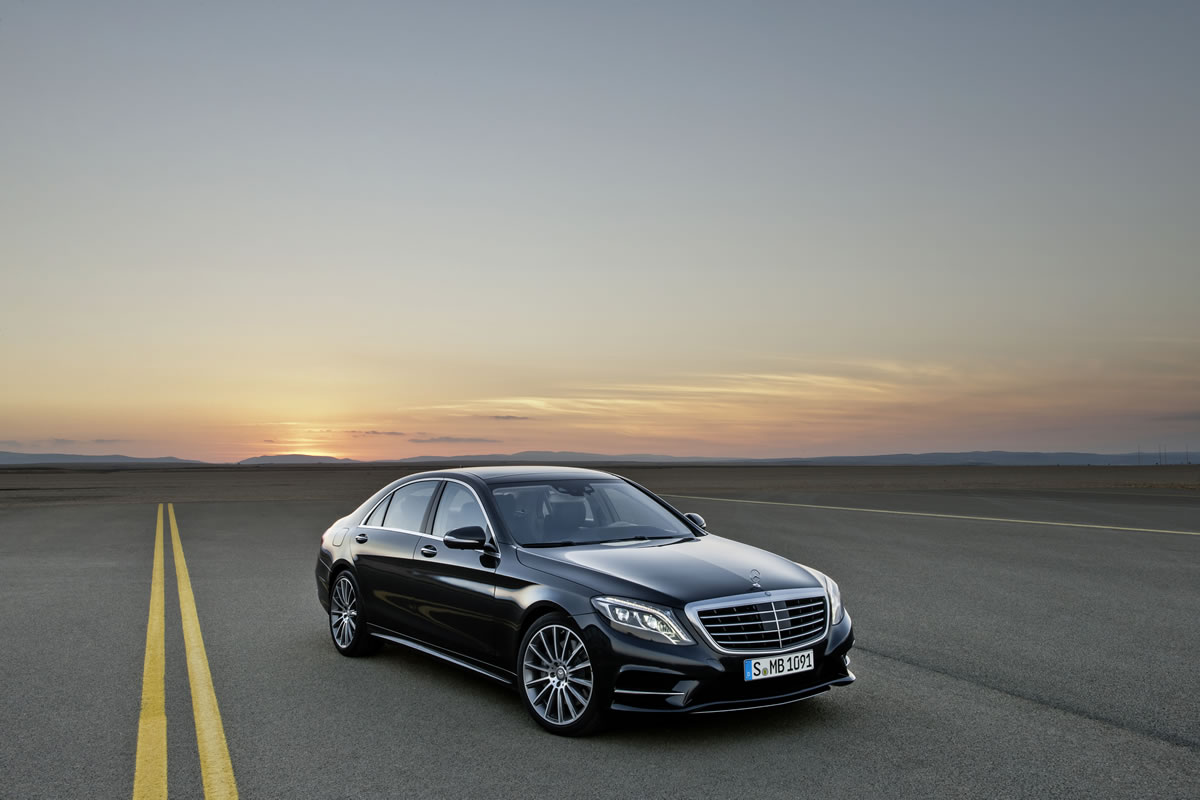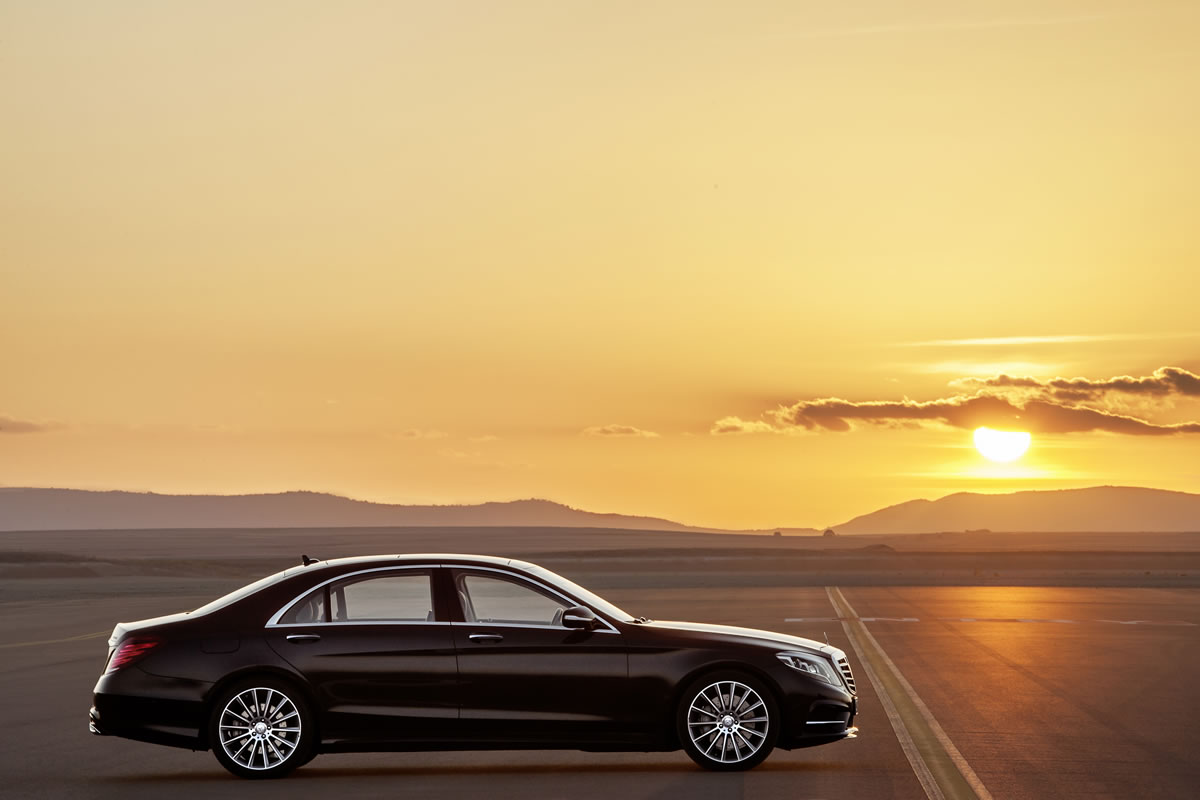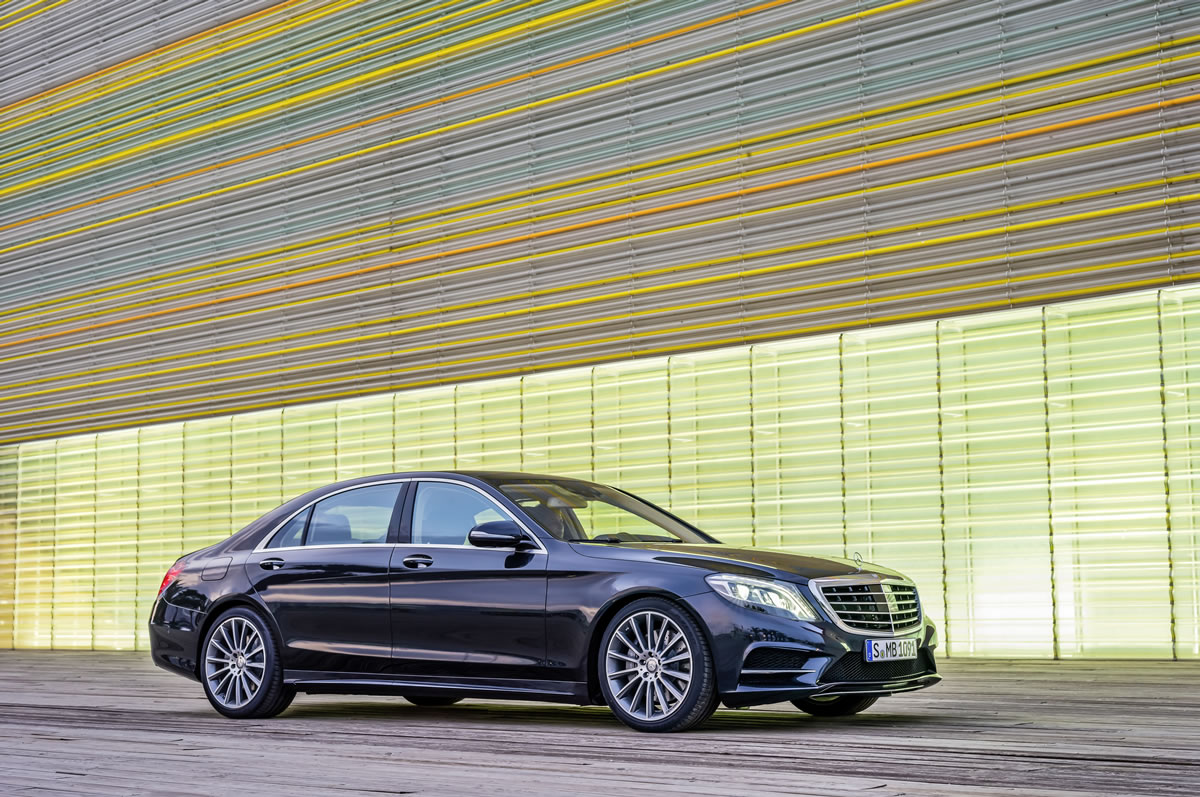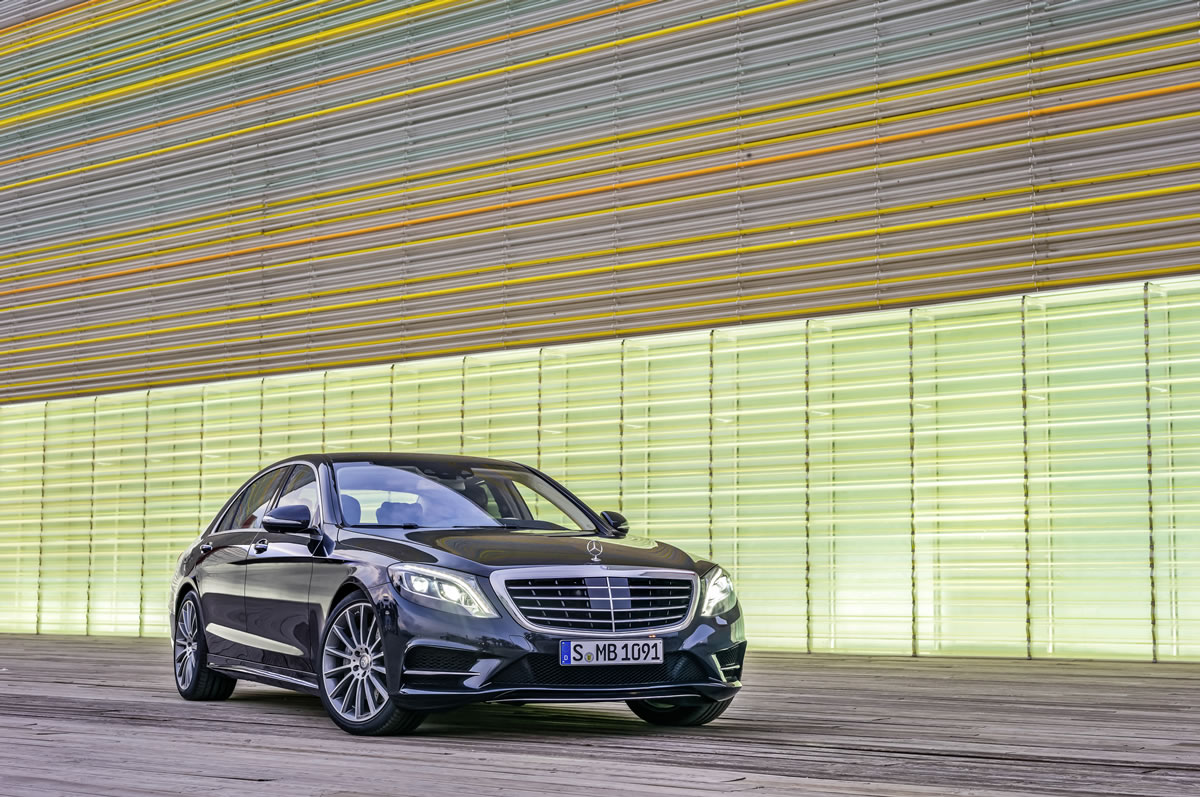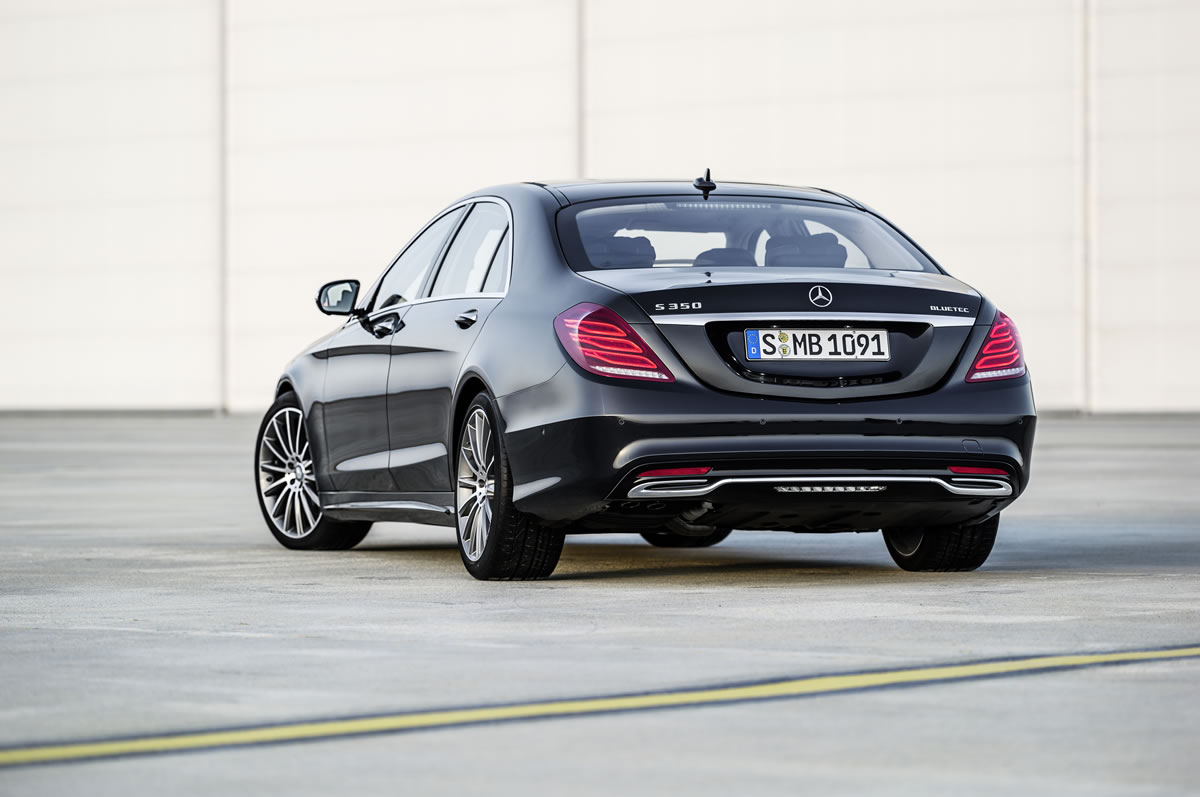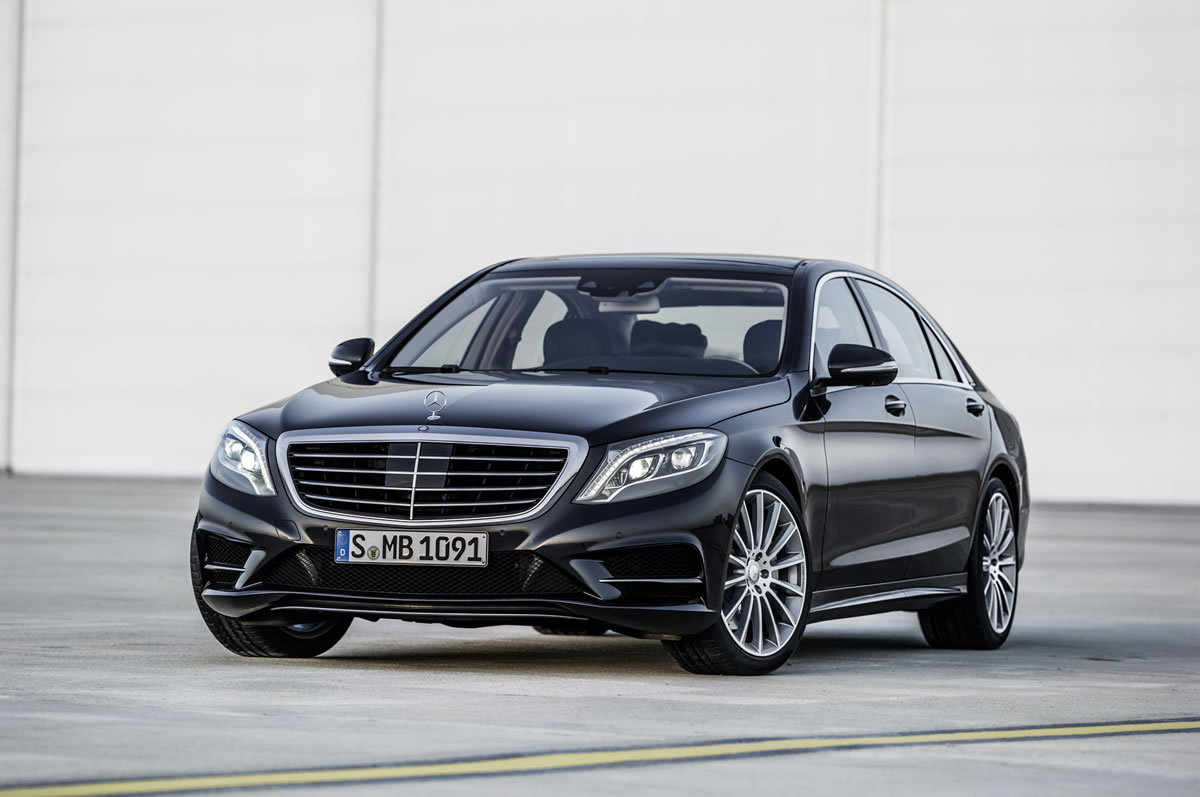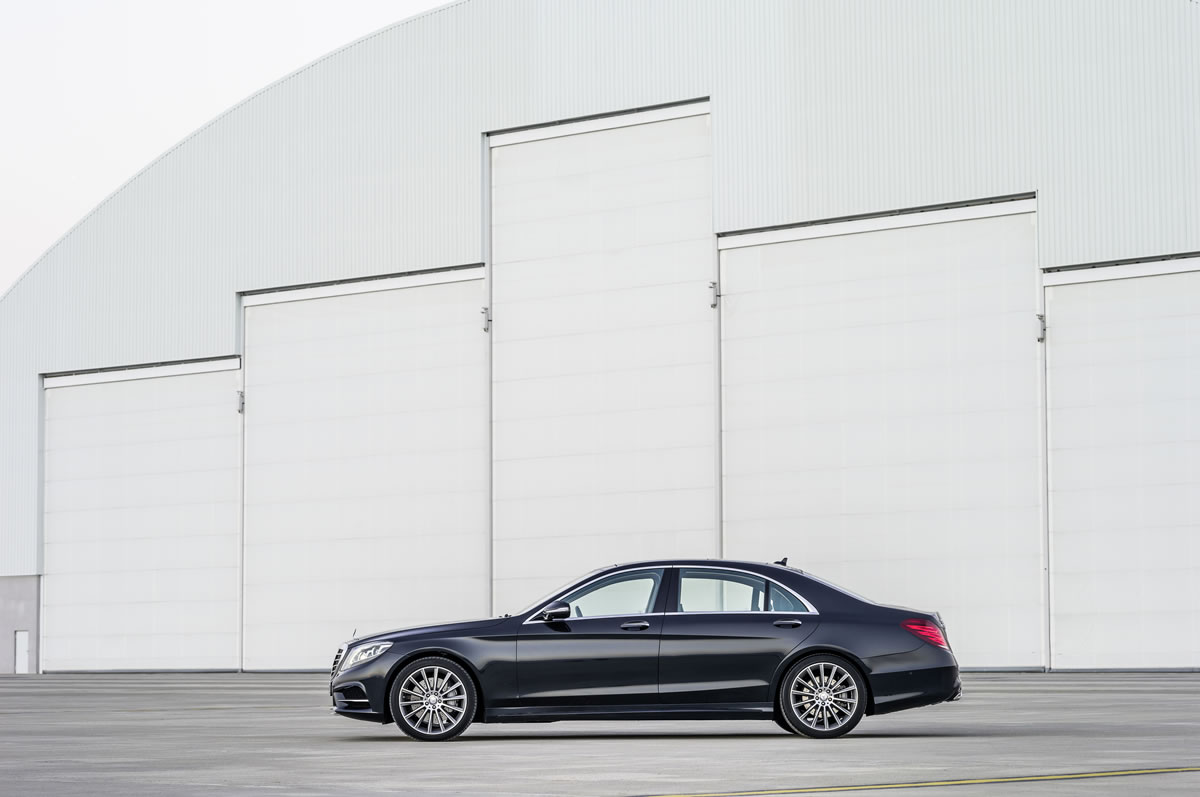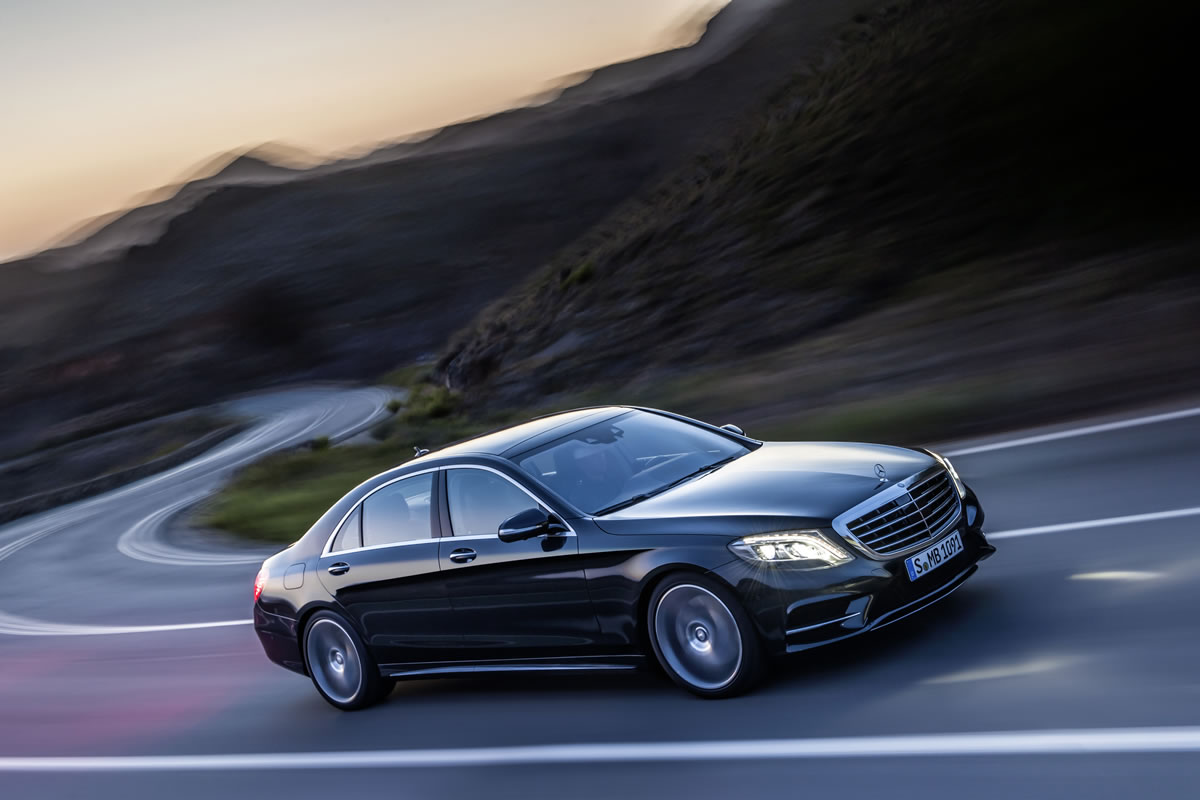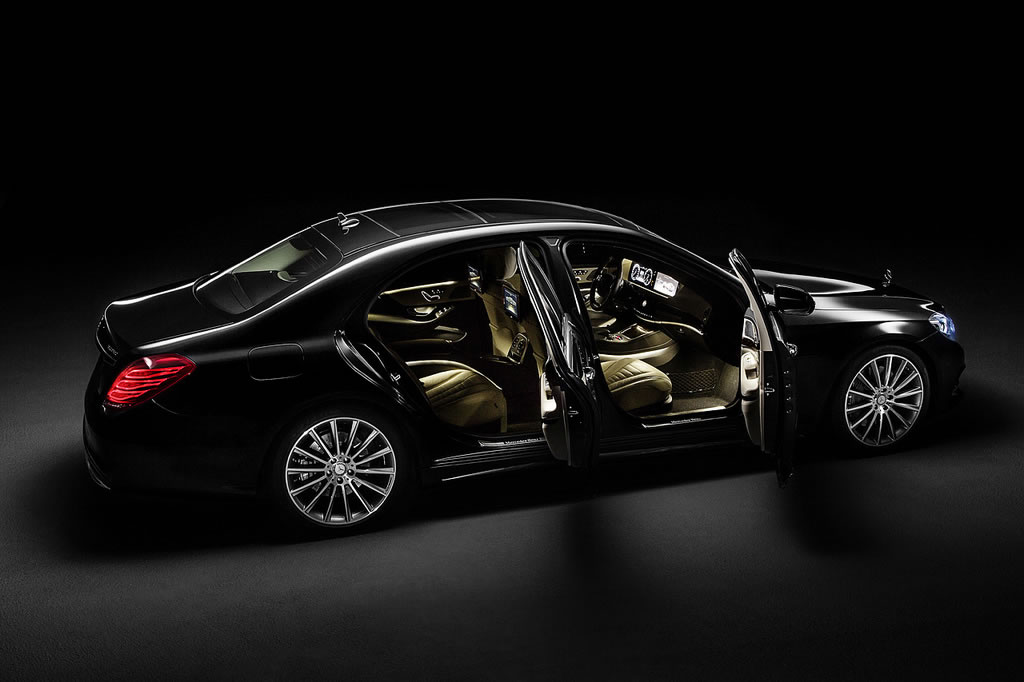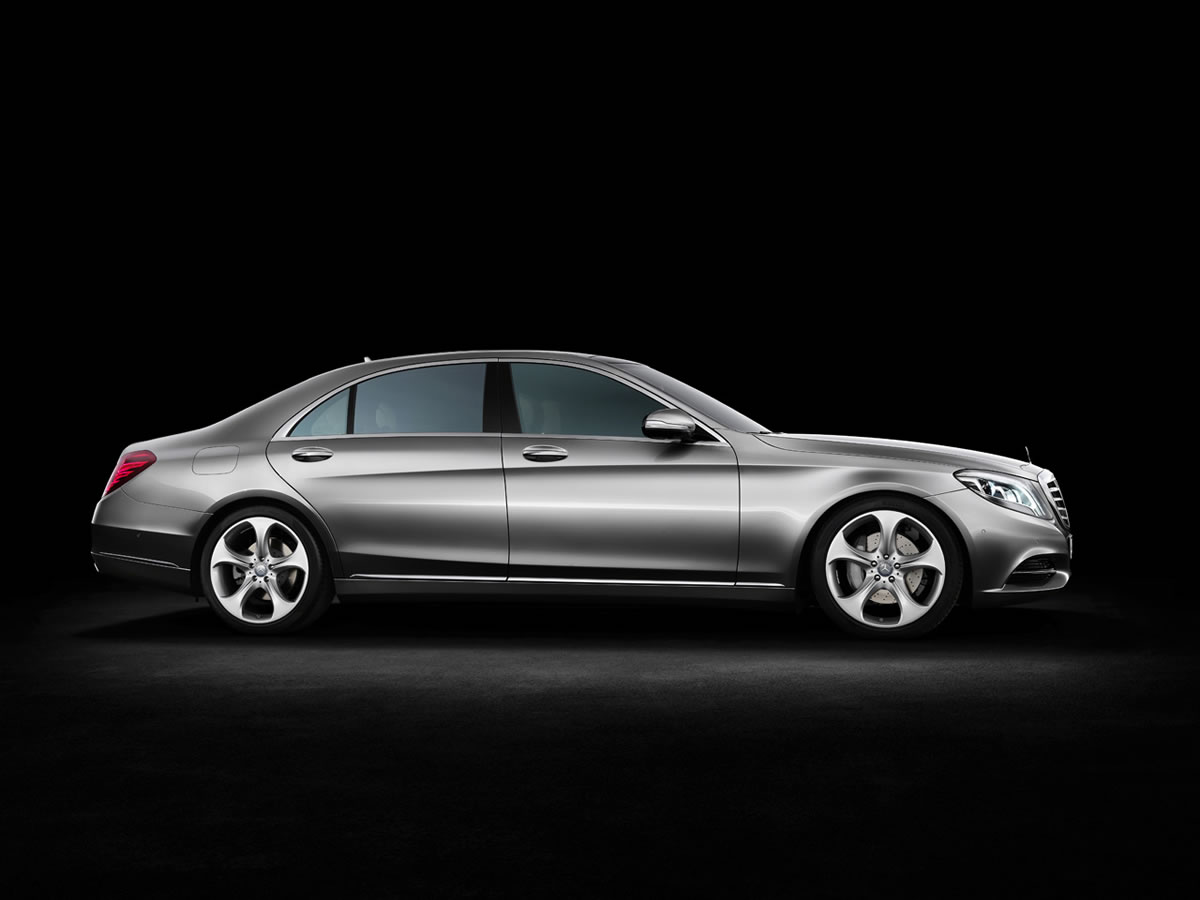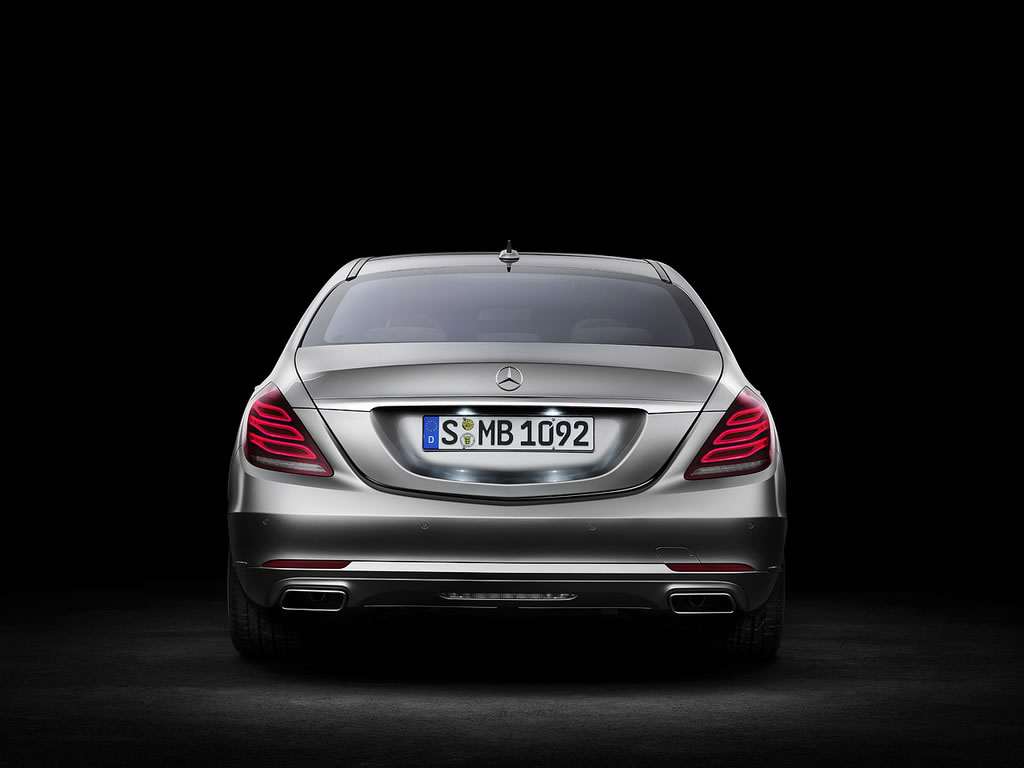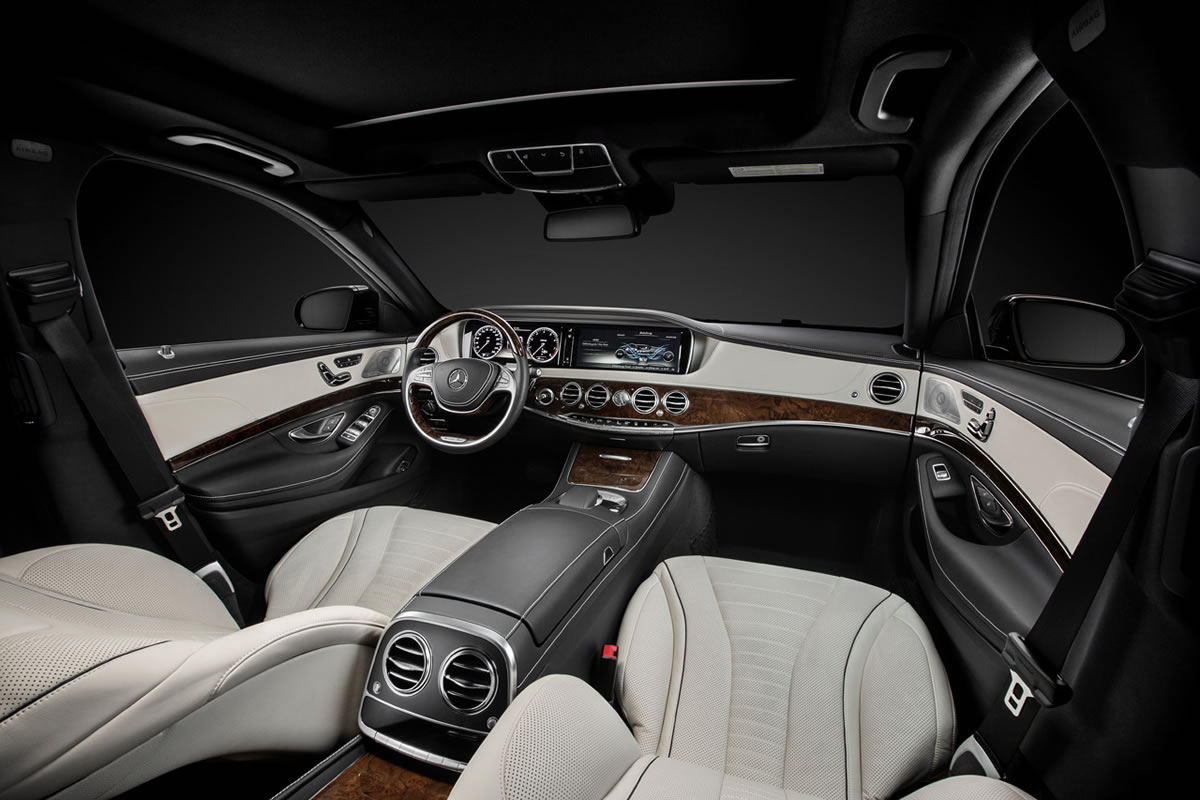Just like past versions of the Mercedes-Benz S-Class, the new S-Class will set the benchmark for luxury vehicles across the board, retaining its well deserved accolade as “the best automobile in the world”. Already it has won two 2013 Automotive Brand Contest awards for the “Best of the Best” exterior and interior. The new S-Class was designed three engineering priorities “Intelligent Drive”, “Efficient Technology” and “Essence of Luxury”, the new S-Class pushes the boundaries of technology on every level.
“Rather than being about safety or aesthetics, power or efficiency, comfort or dynamism, our aspirations were ‘the best or nothing’ in every respect. No other car stands for the Mercedes-Benz brand promise more than the S-Class.” Dr Dieter Zetsche, Chairman of the Board of Management of Daimler AG and Head of Mercedes-Benz Cars:
Perfection to the last detail results in “The Essence of Luxury”. This pursuit of the best is particularly noticeable in the interior: whether it is the seats or the air conditioning, the controls or the design, the infotainment or the comfort and safety in the rear – new ideas, their painstaking realisation, and highest perceived quality underpin the high standards that the engineers have set for the Mercedes-Benz flagship model – and for themselves.

2014 Mercedes-Benz S 400 HYBRID
The same applies to safety. What started with PRE-SAFE® ten years ago and continued with DISTRONIC PLUS has now resulted in a new dimension of motoring: comfort and safety are merged into one. Mercedes-Benz refers to this as “Intelligent Drive”. A whole host of new systems makes the new S-Class even more comfortable and even safer.
The S-Class is so efficient that it almost sounds utopian: within ten years Mercedes-Benz, by realising “Efficient Technology”, has almost halved fuel consumption in the 150 kW output category to 4.4 litres per 100 kilometres, for example, while the drag coefficient of the new S-Class (cd=0.24) clearly undercuts the previous model’s figure and sets a new benchmark in this segment. The S 300 BlueTEC HYBRID is set to go even lower still with a cd figure of 0.23 thanks to additional aerodynamic optimisation measures. Furthermore, the new model is the world’s first car to dispense entirely with light bulbs in favour of LEDs, pointing the way ahead once again.
Design: a modern sense of status and sensual shapes
People all over the world can recognise a Mercedes-Benz straight away. The classic Mercedes face runs like a golden thread through the brand’s history. “The sophisticated design of the S-Class has always been an expression of luxury and automotive grandeur of its era. And our new S-Class continues this tradition. With its classic architecture and flowing silhouette, it is a modern embodiment of sensual clarity. The design draws a line from the sophisticated, progressive design idiom to the classic elegance of our 1930s cars – intelligence that speaks to the emotions. Stylish sportiness and sensual forms in synthesis with timeless clarity and effortless superiority make the S-Class a true design icon,” says design chief Gorden Wagener.
To underline the effortless superiority of the new S-Class, and its ambition to lead, the radiator grille is now larger, upright and distinctly three-dimensional in design. With its long bonnet, the flowing, domed roof line and the gently slanting rear end, the new S-Class has classic saloon proportions. The size and space have been fashioned in such a way that the S-Class appears prestigious, and the powerful roof line is also in keeping with the car’s sporty coupé-style intentions.
A character line descending discreetly from front to rear – the brand’s hallmark “Dropping Line” – elegantly structures the side wall and generates additional dynamism even when the car is at a standstill. The subtly created convex-concave effect of the entire flank gives rise to an extremely powerful and elongated car body that demonstrates both excitement and calm. The pronounced shoulder above the rear wheel adds further emphasis to the car’s athletic character.
The positively exaggerated surfaces and lines of the side wall on the new S-Class generate excitement as they flow into the rear end. As well as being elegant, the slightly slanting form has aerodynamic advantages. Horizontal lines running from the boot lid to the bumper emphasise the car’s width when viewed from the rear. The hallmark signature of the Mercedes-Benz designers can also be seen in the rear windscreen, which cuts into the C-pillars. The upper area of the glass is rounded, lending it a coupé-like character. The real highlights are the new-style tail lights which are completely encased by the car body and, thanks to this solitarily integrated styling and meticulously crafted inner workings, complete the design right down to the last detail.

Mercedes-Benz S 350 BlueTEC
LED technology: the first ever car without a single light bulb
100 years or so after the introduction of electric lighting in motor vehicles, Mercedes-Benz is now making a complete switch to LED technology – the new S-Class is the first vehicle in the world whose interior and exterior do without a single light bulb, and sees Mercedes-Benz building on its pioneering role in the lighting sector. The lighting’s multi-level functionality is another world first: out of consideration for any road users behind, the intensity of the brake lights is reduced at night or while waiting at traffic lights, for example. Almost 500 LEDs illuminate the road, the vehicle, the interior and the boot. Depending on equipment, these include:
- Headlamps: each with up to 56 LEDs
- Tail lights: each with up to 35 LEDs (plus 4 for the rear fog lamp)
- Interior (including ambient lighting): approx. 300 LEDs
Visibility is enhanced by two assistance systems that have undergone some key improvements – Adaptive Highbeam Assist Plus and Night View Assist Plus. Thanks to a new stereo camera and multistage radar sensors, the S-Class has 360-degree all-round vision and detects potential dangers on the road better.
Drive system: class-leading efficiency in every output category
In its first year the new S-Class line-up features two hybrid versions, a petrol model and a diesel variant: S 400 HYBRID, S 500, S 350 BlueTEC and S 300 BlueTEC HYBRID. All models boast class-leading efficiency and up to 20 percent lower fuel consumption than the outgoing model series. All the engines already meet the requirements of the Euro-6 emissions standard. In addition to this, the S 400 HYBRID and S 350 BlueTEC meet the strict criteria of efficiency class A, while the S 300 BlueTEC HYBRID even has an A+ rating.
“The new S-Class achieves consumption and emissions figures that only a few years ago seemed utopian, even for executive cars,” says Prof. Thomas Weber, member of the Daimler Board of Management responsible for Group Research and Head of Mercedes-Benz Cars Development. “And this is just the start of our ‘Green Leadership’ initiative: soon to be followed by the S 500 Plug-In HYBRID – the first S-Class with a fuel consumption lower than four litres per 100 kilometres.” The S-Class line-up therefore includes the full range from petrol and diesel models to petrol, diesel and plug-in hybrids for the first time.

Model data at a glance:
| Model | S 400 HYBRID | S 500 | S 350 BlueTEC | S 300 BlueTEC HYBRID |
| Number of cylinders/arrangement | 6/V | 8/V | 6/V | 4/in-line |
| Displacement (cc) | 3498 | 4663 | 2987 | 2143 |
| Rated output (kW/hp at rpm) | 225/306 at 6500 |
335/455 at 5250 |
190/258 at 3600 |
150/204 at 4200 |
| Rated output of electric motor (kW) | 20 | – | – | 20 |
| Rated torque (Nm at rpm) | 370 at 3500-5250 | 700 at 1800-3500 | 620 at 1600-2400 | 500 at 1600-1800 |
| Rated torque of electric motor (Nm) | 250 | – | – | 250 |
| Combined fuel consumption from (l/100 km) | 6.3 | 8.6 | 5.5/5.61 | 4.4 |
| Combined CO2 emissions from (g/km) | 147 | 199 | 146/1481 | 115 |
| Efficiency class | A | D | A | A+ |
| Acceleration 0-100 km/h (s) | 6.8 | 4.8 | 6.8 | 7.6 |
| Top speed (km/h) | 250 | 250 | 250 | 240 |
1 Figures for short/long wheelbase
Suspension: the world’s first suspension with “eyes”
The new S-Class is the world’s first car to be able to detect bumps on the road ahead. If ROAD SURFACE SCAN detects such unevenness by means of the stereo camera, MAGIC BODY CONTROL instantaneously sets up the suspension to deal with the new situation. This innovative suspension system is available as an option for the eight-cylinder models. Standard equipment for the new S-Class includes the continuously operating Adaptive Damping System ADS PLUS and an enhanced version of the full air suspension system AIRMATIC.
Interior: visual breadth and calm solidity
With its clear architecture, the interior design of the S-Class embodies a classic, superior, cutting-edge saloon. The interior’s expressive character derives from a uniquely fluid, sensuously elegant style. Horizontal elements and lines create a setting characterised by visual breadth and calm solidity. High quality and elegance harmonise with clarity and functionality: the interior design of the S-Class combines ride comfort, spaciousness and user-friendliness to the very highest standard.
The perfectly coordinated use of materials and colours produces an exclusive interior seemingly cast from a single mould. There is generous use of wood trim, especially in the dashboard and centre console. Metallised switch surfaces with pearl-effect paint finishes in three colour shades to suit the interior colour particularly highlight the outstanding quality.
Passengers in the rear are also seated in first-class – the design and exclusivity of the seats, door panels and all controls are to the same, high standard as the front. As an additional individualisation feature, the “First Class Rear” incorporates a Business centre console combining personal comfort with practical convenience (integration of a telephone handset, additional stowage compartments, folding table, etc.).
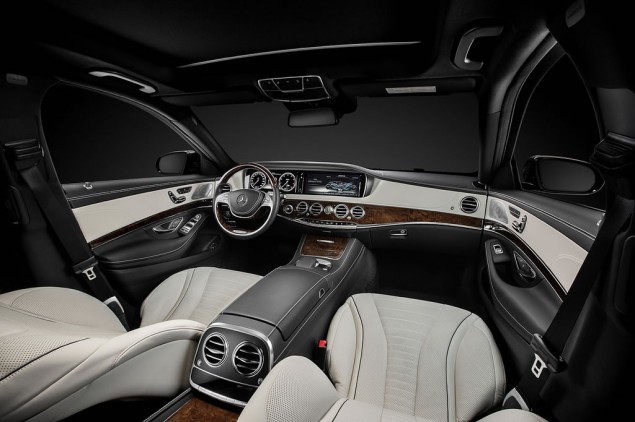
Concept: the best for both worlds
For the first time in the history of the S-Class, the development focus was on the long-wheelbase Saloon. Unlike before, the short-wheelbase version was derived from this. This is because the S-Class is not only firmly positioned as a prestige saloon in the large overseas markets such as the USA, China or Japan. Whereas in Europe and North America owners of an S-Class are frequently behind the wheel themselves, the flagship model in the Mercedes-Benz passenger-car portfolio is very definitely a chauffeur-driven vehicle in Asia. The logical consequence is the number of new features specifically related to comfort and safety in the rear – in the S-Class, there is no doubt that passengers in the rear are also seated in first class.
The occupants of the new S-Class benefit from the moderate increase in vehicle size [1] by an improvement in all the interior dimensions: there are 12 millimetres of extra headroom for the driver, as well as 14 millimetres more shoulder room and 10 millimetres more elbow room in the front. Thanks to the 14-millimetre increase in rear kneeroom, travel becomes even more comfortable for passengers in the rear. Shoulder room in the rear has been improved by up to nine millimetres.
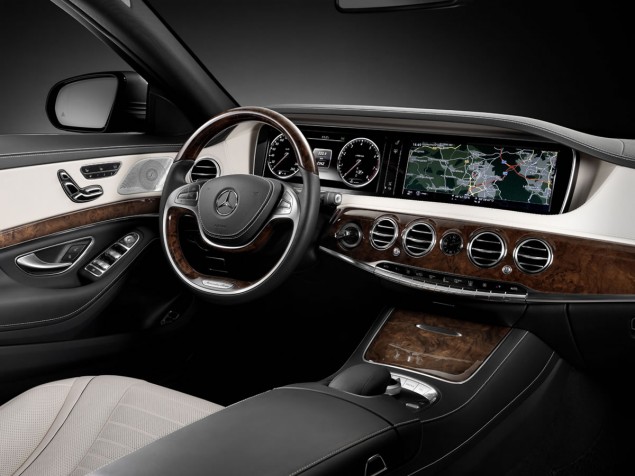
Control and display concept: elegant new command center
Two high-resolution TFT colour displays in 8:3 format with a screen diagonal of 30.7 cm (12.3 inches) form the new information centre in the S-Class. The left-hand display performs the functions of the previous instrument cluster, providing the driver with all relevant information. The right-hand display allows the convenient control of infotainment and comfort functions. For the new S-Class, the constantly increasing need to integrate additional functions into the vehicle led to a further development of the entire operating logic. Here ergonomics, operating convenience and safety along with attractiveness and aesthetics were the main considerations.
The aim in designing the control and display features was to group controls and display functions together in a coherent manner in terms of both design and functionality. Apart from the new displays, the metallised switch surfaces and solid aluminium controls are visual highlights of particularly high quality. Thanks to the fine structuring on the metal surfaces, each individual control has the sound, feel and attention to detail that makes a Mercedes-Benz so special.
The new control features include a touch-sensitive telephone keypad and an extended favourites function with twelve freely selectable memory places. The principal control element is the rotary pushbutton, with the usual direct access keys in the centre console for the most important functions and a toolbar for the driving assistance systems.
Voice entry using LINGUATRONIC via the Speech Dialog System allows complete addresses to be spoken in one go, for example (one-shot input). The telephone and audio systems can also be voice-controlled. The option of having text messages (SMS) or emails read out is a new feature.
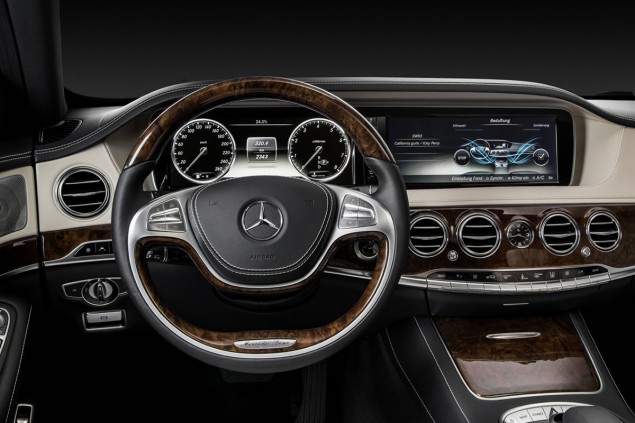
Climate control: a wealth of new features for a pleasant atmosphere
During the systematic further development of the entire climate control system, a particular focus was placed on the development goals of performance, air quality, precise regulation, noise level and efficiency. As a new feature, the AIR-BALANCE package comprises perfume atomisation, ionisation and even more efficient filtration compared with the standard model. The THERMOTRONIC automatic climate control in the rear has two additional zones to improve thermal comfort. Electric heating of the armrests is a completely new feature.
As a world first, the new S-Class Saloon has an “active perfuming system” as part of the AIR-BALANCE package. ‘Active’ means that the perfuming system is switched on and off manually, with manual adjustment of the intensity. The perfume atomisation system individualises the smell of the vehicle interior. It neither changes the interior smell permanently, nor are perfume molecules deposited on fabric surfaces or clothing. The fragrance is discreet and mild, and dissipates rapidly.
Seats: mobile office and centre of wellbeing
With numerous world firsts such as the ENERGIZING massage function based on the hot-stone principle or active seat ventilation with reversing fans, Mercedes-Benz has raised seating and climatic comfort in the S-Class to a new level. The seat developers have paid particular attention to the rear seats. There is a choice of five different rear seat variants including an Executive seat with a backrest angle adjustable by up to 43.5 degrees, allowing occupants in the rear to concentrate on work or relax in comfort.
The ENERGIZING massage function on the hot-stone principle is a world first. The seat specialists at Mercedes-Benz have developed a unique massage function with 14 separately actuated air cushions in the backrest, as well as an integrated warming function. There is a choice of six massage programmes, two of them using the warming function. The function is also available for the rear seats.
For the first time, so-called reversing fans are used in the active seat ventilation system. When the ventilation function starts, cooler surrounding air is first drawn onto the seat surface. This enables the surface temperature of a heated-up seat to be reduced much faster than with the previous active cooling systems. After four minutes the fans are automatically switched to blower mode to reduce draughts.
Two rear seat variants (static bench seat or individual seats with 37-degree adjustment) are available for the standard-wheelbase S-Class, and no less than five for the long-wheelbase version. The adjustment kinematics have been changed in the luxury and reclining seat variants. Unlike the conventional trailing backrest design, the backrest is adjusted separately so that the legroom and seat reference point remain unchanged. The cushion can be separately adjusted for angle and horizontal position.
The maximum backrest angle of the Executive seat (reclining seat) behind the front passenger seat is increased from 37 to 43.5 degrees, giving it the largest backrest inclination in the luxury segment. The reclining seat features a calf support which is freely adjustable for length and angle. In combination with the heel rest on the folding chauffeur seat at the front and an additional comfort cushion, this allows a reclined position that sets new standards in the automotive sector with respect to sleeping and resting comfort.
If the “First Class Rear” is specified (with rear centre console), the front console on the transmission tunnel is visually continued to the rear. It is equipped with innovative thermo-cup holders which use Peltier technology to cool or warm drinks over a longer period of time. Like an aircraft seat, the centre console is available with two tables which can be easily folded in or out using one hand.
Multimedia features: mobile concert hall
A completely new multimedia generation with intuitive operation and particularly tangible functions thanks to visualisation and animations celebrates its debut in the S-Class. Other innovations include the multi-user system, which allows independent access to the media sources of the entertainment system from any seat.
The innovative Frontbass system developed by Mercedes-Benz‑and used for the first time in a saloon car is a feature common to all the audio systems: the woofers are housed in the firewall, and use the almost 40-litre space in the cross-member and side member as a resonance chamber. Conventional woofers in the doors are therefore unnecessary. The mid-range speakers in the doors are relocated upwards. This improves the soundscape and allows additional stowage space in the doors.
As alternatives to the standard sound system with ten loudspeakers, two very high-quality audio systems are available which were developed together with the high-end audio specialist Burmester: the Burmester® Surround Sound system and the Burmester® High-End 3D‑Surround Sound system.
The interactive presentation of content is a prominent new feature of the navigation function. The new navitainment functions include an animated compass, the “Driveshow” for passenger information as in an aircraft, and the display of Google Maps on the head unit and in the rear. Information on the traffic situation is shown with hatched lines (rather than with vehicle silhouettes as before). With the new Live Traffic Information service, traffic data is transmitted in real time. As a result, the navigation system is better informed about the situation on the roads.
Body: maximum stability and high-quality lightweight design
A high level of crash safety, outstanding rigidity for excellent handling with extremely low levels of noise and vibration. These were the aims when developing the bodyshell for the new S-Class – a third-generation aluminium hybrid bodyshell. The lightweight index – the torsional stiffness in relation to weight and vehicle size – has been improved by 50 percent compared to the predecessor model.
Since the 220 model series was developed in the 1990s, with an optimally coordinated materials mix the hybrid lightweight construction has been further developed into an aluminium hybrid bodyshell. During this period the share of aluminium has increased to more than 50 percent. It has therefore been possible to maintain practically the same body weight for 20 years and even slightly reduce it, despite far more stringent comfort and safety requirements and additional functions. In addition to this, structural foams are used at specific points in node areas in the new model series. The entire outer skin of the S-Class, including the roof and the front section of the body, consists of aluminium. The high percentage of aluminium is possible thanks to the use of a complete range of semi-finished products (casting, extrusion, sheet metal). The safety passenger cell is made using an extremely high percentage of high-strength steel.
This lightweight design by material and geometrical optimisation coupled with highly complex joining technology allows the new S-Class to further raise the bar in the demanding luxury saloon segment – without adding weight. With a torsional stiffness of 40.5 kN/degree (predecessor: 27.5 kN/degree), the S-Class achieves a new record in its segment.
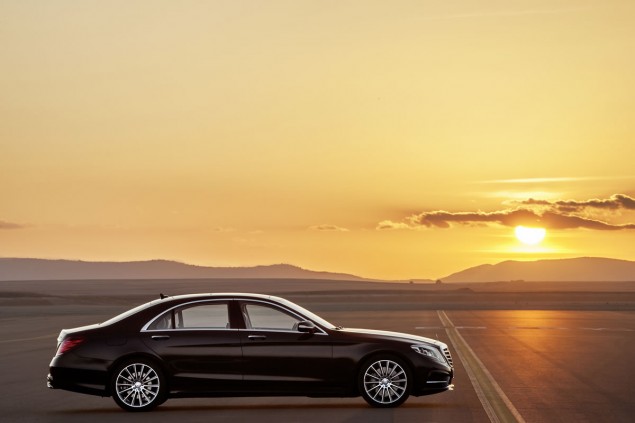
Extended PRE-SAFE® protection: prevention is better than cure
Ten years ago, Mercedes-Benz unveiled a groundbreaking safety concept in the S-Class in the form of the PRE-SAFE® anticipatory occupant protection system, which has been undergoing continuous refinement ever since. Now, the safety pioneer is increasing protection levels once again.
The new PRE-SAFE® functions can help to prevent collisions with pedestrians and vehicles in front in city traffic, defuse dangerous situations caused by traffic behind and enhance the protection offered by the seat belts.
- The PRE-SAFE® Brake can also detect pedestrians and initiate autonomous braking to avoid a collision at speeds up to 50 km/h.
- PRE-SAFE® PLUS can recognise an imminent rear-end collision and warn the following traffic by activating the rear hazard warning lights at a high frequency. If the danger of a collision persists, the system can also firmly apply the stationary vehicle’s brakes and thus minimise the risk of whiplash injuries by reducing the forward jolt caused by the impact. This additionally can reduce the risk of secondary accidents. Immediately before impact, the PRE-SAFE® anticipatory occupant protection measures, especially the reversible belt tensioners, are deployed.
- With PRE-SAFE® Impulse, the driver and front passenger are pulled away from the direction of impact by their seat belts at an early phase of the crash before the resulting occupant deceleration sets in. This can substantially reduce the risk and severity of injuries in a frontal collision.
Setting the standard for safety in the rear: new features in the S-Class
Mercedes-Benz has extended the safety system for rear seat passengers further with the seat belt buckle extender, the beltbag and the cushionbag. The first two of these developments are included in the “PRE-SAFE® rear package”. With the illuminated seat belt buckle extender, an electric motor extends and retracts the belt buckle automatically. In this way, any belt slack in the area of the pelvis and thorax can be reduced so that passengers are secured more firmly in both the sideways and the lengthways direction.
The beltbag is an inflatable seat-belt strap that is able to reduce the risk of injury to passengers in the rear in a head-on collision by lessening the strain placed on the ribcage. The reclining seat is equipped with a cushionbag under the seat cushion upholstery as standard. When the seat is reclined, it prevents the occupant from sliding beneath the seat belt (so-called submarining) in an accident. This has enabled Mercedes-Benz to design a comfortable reclining seat which provides a higher level of accident safety than a seat with a trailing backrest.
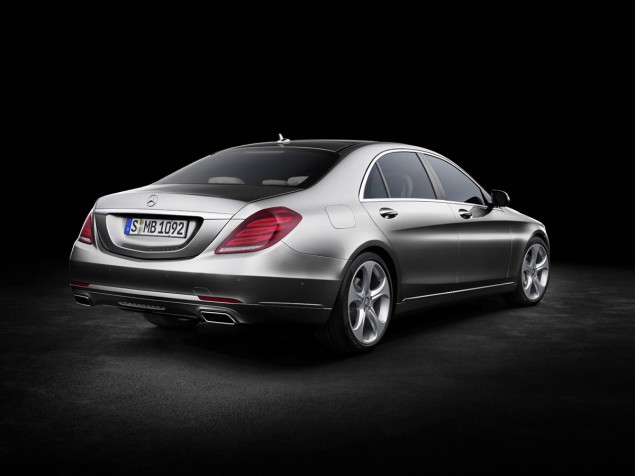
Intelligent Drive: networked with all senses
Avoid accidents and mitigate their consequences – this is the integrated approach adopted by Mercedes-Benz Accident Research under the heading “Real Life Safety”. Mercedes-Benz is systematically pursuing this strategy in the S-Class with numerous new assistance systems and greatly enhanced functions. Comfort and safety are enhanced at the same time. Mercedes-Benz calls this “Intelligent Drive”. The new functions all rely on the same sensor system, comprising a new stereo camera together with multistage radar sensors.
“Intelligent assistance systems analyse complex situations and better recognise potential dangers out on the road with the aid of improved environment sensor systems,” explains Prof. Thomas Weber, Member of the Daimler Board of Management responsible for Group Research and Head of Mercedes-Benz Cars Development. “Figuratively speaking, the new S-Class doesn’t just have eyes at the front, it has 360-degree all-round vision.” A key factor is the networking of all systems, which safety experts call “sensor fusion”. The aim is to ensure comprehensive protection, not just for the occupants of a Mercedes-Benz, but for all other road users, too.
The support functions range from relieving the burden on the driver and therefore increasing comfort, to issuing visual, acoustic and/or tactile warning signals, to boosting the driver’s reactions. Some systems are even able to take corrective action in an emergency, such as autonomous application of the brakes to prevent an accident or lessen its severity. Here is a summary of the new assistance systems and those with notably enhanced functionality:
- DISTRONIC PLUS with Steering Assist and Stop&Go Pilot takes the burden off the driver when it comes to lane guidance and is also able to follow vehicles in traffic jams automatically.
- For the first time, thanks to the stereo camera the Brake Assist system BAS PLUS with Cross-Traffic Assist is able to detect crossing traffic and pedestrians too, and to boost the braking power applied by the driver accordingly.
- If the lane markings are broken lines, Active Lane Keeping Assist can detect when the adjacent lane is occupied, especially by oncoming traffic, and reduce the risk of the vehicle leaving its lane unintentionally by applying the brakes on one side.
- Adaptive Highbeam Assist Plus allows the high-beam headlamps to be kept on permanently without dazzling traffic by masking out other vehicles in the beams’ cone of light.
- Night View Assist Pluswas further improved and supplemented by a thermal imaging camera. Night View Assist Plus can alert the driver to the potential danger posed by pedestrians or animals in unlit areas in front of the vehicle by automatically switching from the speedometer to a crystal-sharp night view image and highlighting the sources of danger. A spotlight function is furthermore able to flash any pedestrians detected ahead. This attracts the driver’s attention to the source of the danger at the same time as warning the person on the side of the road.
- ATTENTION ASSIST can warn of inattentiveness and drowsiness in an extended speed range and notify the driver of their current state of fatigue and the driving time since the last break, offers an adjustable sensitivity setting and, if a warning is emitted, indicates nearby service areas in the COMAND navigation system.
The prices in Germany (incl. 19% VAT) for the new S-Class start at 79,789.50 euros for the short-wheelbase S350 BlueTEC.
The prices at a glance:
| Diesel | Euros | |
| S 350 BlueTEC | Short wheelbase | 79,789.50 |
| S 350 BlueTEC | Long wheelbase | 85,323.00 |
| Petrol | ||
| S 400 HYBRID | Short wheelbase | 85,204.00 |
| S 400 HYBRID | Long wheelbase | 91,094.50 |
| S 500 | Short wheelbase | 104,601.00 |
| S 500 | Long wheelbase | 107,635.50 |
- [1] Length/width/height short-wheelbase version: 5116/1899/1483, wheelbase 3035 mm
- Length/width/height long-wheelbase version: 5246/1899/1483, wheelbase 3165 mm
